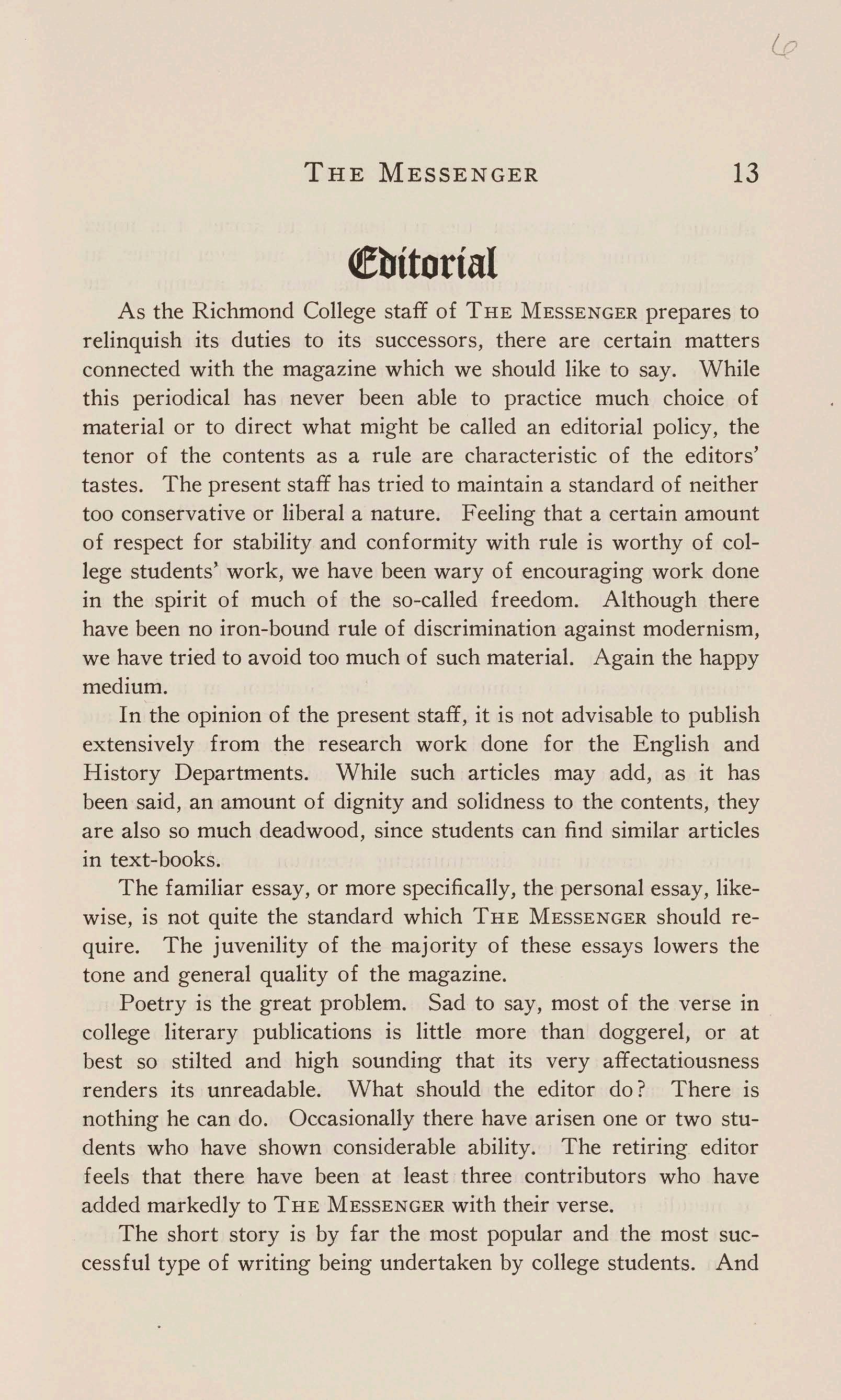

~bitorial
As the Richmond College staff of THE MESSENGERprepares to relinquish its duties to its successors, there are certain matters connected with the magazine which we should like to say. While this periodical has never been able to practice much choice of material or to direct what might be called an editorial policy, the tenor of the contents as a rule are characteristic of the editors' tastes. The present staff has tried to maintain a standard of neither too conservative or liberal a nature. Feeling that a certain amount of respect for stability and conformity with rule is worthy of college students' work, we have been wary of encouraging work done in the spirit of much of the so-called freedom. Although there have been no iron-bound rule of discrimination against modernism, we have tried to avoid too much of such material. Again the happy medium.
In the opinion of the present staff, it is not advisable to publish extensively from the research work done for the English and History Departments. While such articles may add, as it has been said, an amount of dignity and solidness to the contents, they are also so much deadwood, since students can find similar articles in text-books.
The familiar essay, or more specifically, the personal essay, likewise, is not quite the standard which THE MESSENGERshould require. The juvenility of the majority of these essays lowers the tone and general quality of the magazine.
Poetry is the great problem. Sad to say, most of the verse in college literary publications is little more than doggerel, or at best so stilted and high sounding that its very aff ectatiousness renders its unreadable. What should the editor do? There is nothing he can do. Occasionally there have arisen one or two students who have shown considerable ability. The retiring editor feels that there have been at least three contributors who have added markedly to THE MESSENGERwith their verse.
The short story is by far the most popular and the most successful type of writing being undertaken by college students. And
THE MESSENGER
although THE MESSENGERdoes not boast of its stories, it is hoped that the coming editor will insist on as high, and even higher, an excellence for this particular genre as has been the attempt of the editor in the past.
With profound thanks for the contributions submitted and feeling entirely conscious of the generous spirit of aid from the students, whether writers or readers, the present staff retires.
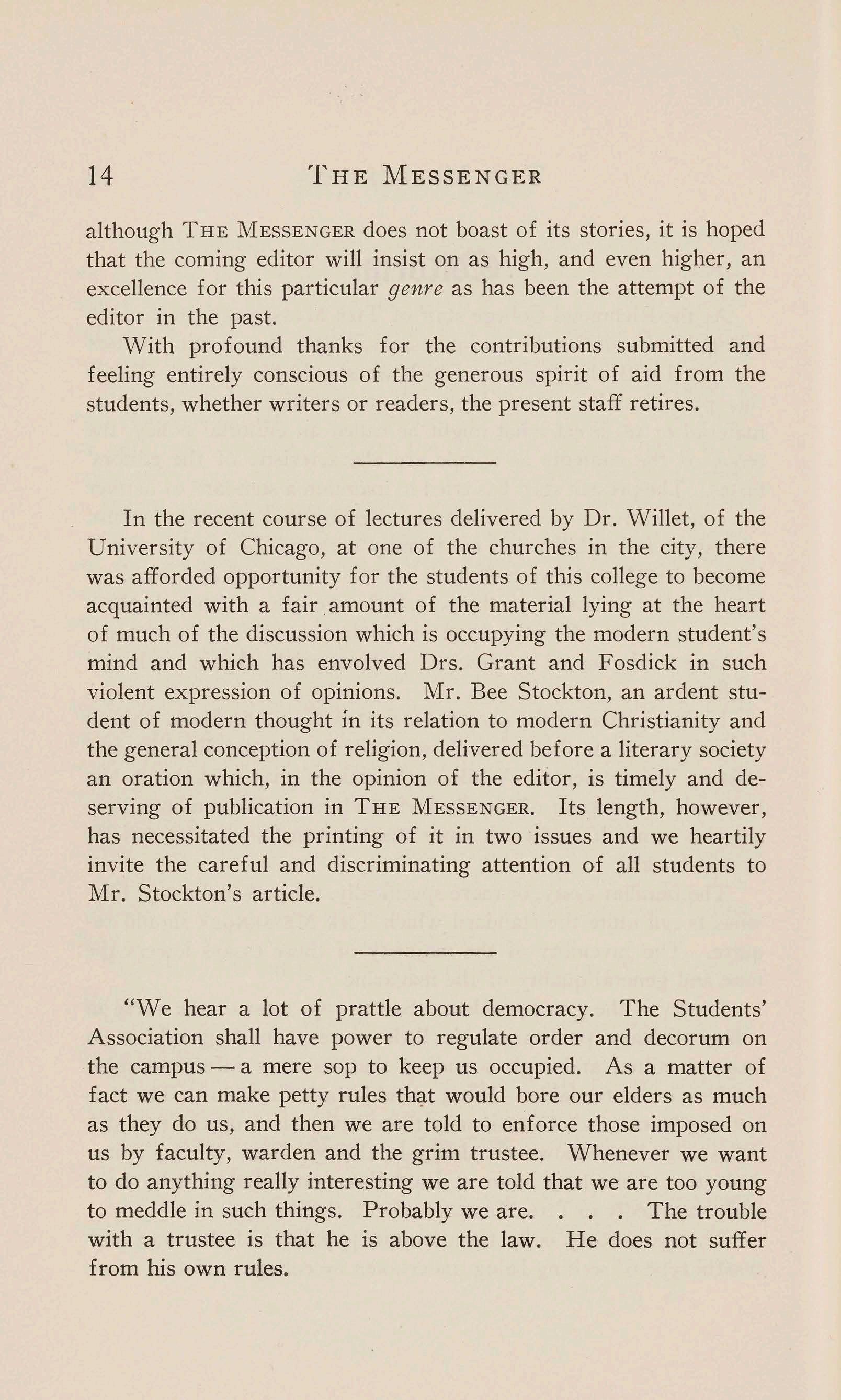
In the recent course of lectures delivered by Dr. Willet, of the University of Chicago, at one of the churches in the city, there was afforded opportunity for the students of this college to become acquainted with a fair amount of the material lying at the heart of much of the discussion which is occupying the modern student's mind and which has envolved Drs. Grant and Fosdick in such violent expression of opinions. Mr. Bee Stockton, an ardent student of modern thought in its relation to modern Christianity and the general conception of religion, delivered before a literary society an oration which, in the opinion of the editor, is timely and deserving of publication in THE MESSENGER. Its length, however, has necessitated the printing of it in two issues and we heartily invite the careful and discriminating attention of all students to Mr. Stockton's article.
"We hear a lot of prattle about democracy. The Students' Association shall have power to regulate order and decorum on the campus -a mere sop to keep us occupied. As a matter of fact we can make petty rules th~t would bore our elders as much as they do us, and then we are told to enforce those imposed on us by faculty, warden and the grim trustee. Whenever we want to do anything really interesting we are told that we are too young to meddle in such things. Probably we a:re. The trouble with a trustee is that he is above the law. He does not suffer from his own rules.
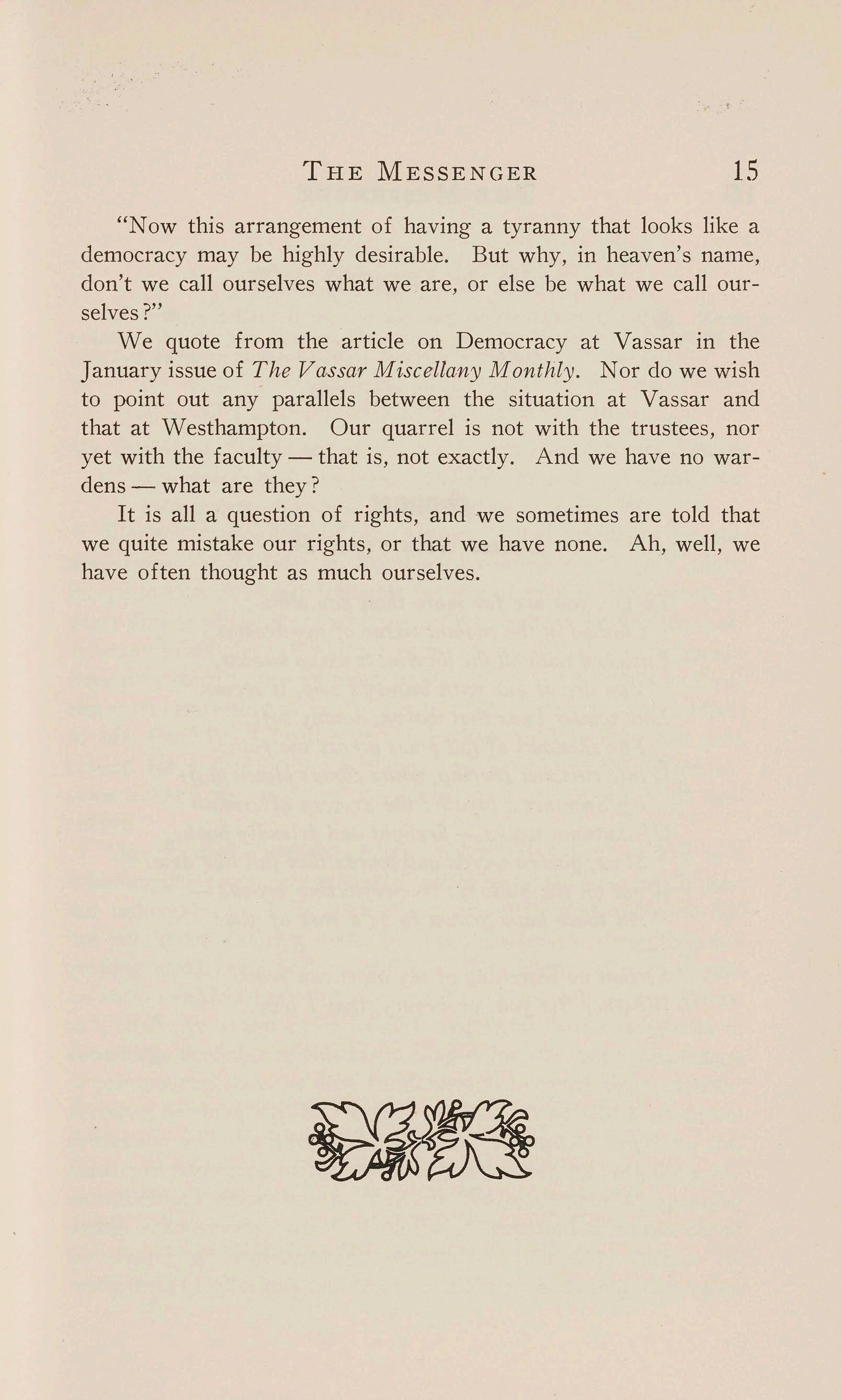
"Now this arrangement of having a tyranny that looks like a democracy may be highly desirable. But why, in heaven's name, don't we call ourselves what we are, or else be what we call ourselves?"
We quote from the article on Democracy at Vassar in the January issue of The Vassar Miscellany Monthly. Nor do we wish to point out any parallels between the situation at Vassar and that at Westhampton. Our quarrel is not with the trustees, nor yet with the faculty-that is, not exactly. And we have no wardens - what are they?
It is all a question of rights, and we sometimes are told that we quite mistake our rights, or that we have none. Ah, well, we have often thought as much ourselves.
THE MESSENGER
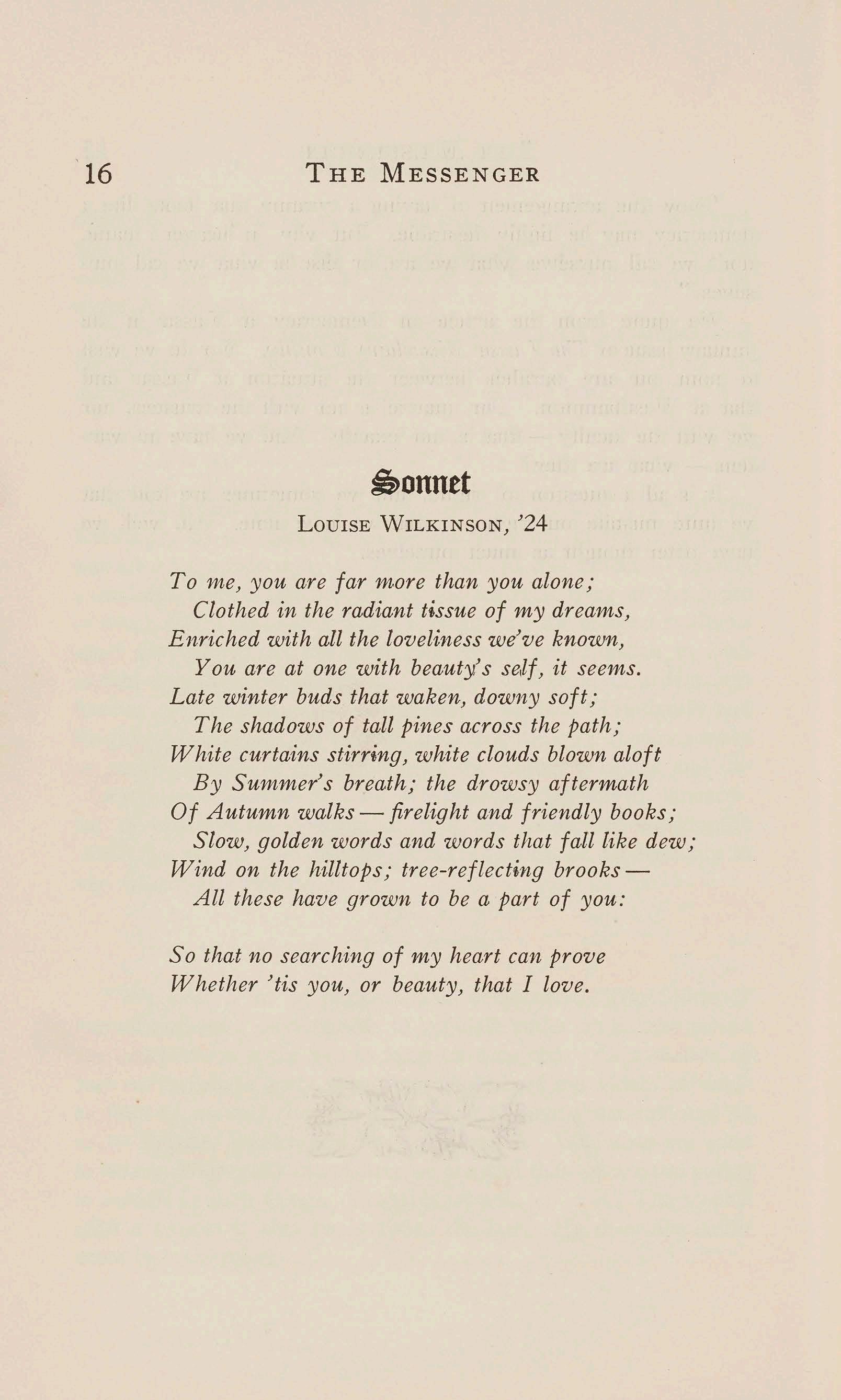
~onnet
LOUISE WILKINSON, '24
To me, you are far more than you alone; Clothed in the radiant tissue of my dreams, Enriched with all the loveliness we've known, You are at one with beauty's se,lf, it seems. Late winter buds that waken, downy soft; The shadows of tall pines across the path; White curtains stirring, white clouds blown aloft By Summer's breath; the drowsy aftermath Of Autumn walks - firelight and friendly books; Slow, golden words and words that fall like dew; Wind on the hilltops; tree-reflecting brooksAll these have grown to be a part of you:
So that no searching of my heart can prove Whether 'tis you, or beauty, that I love.
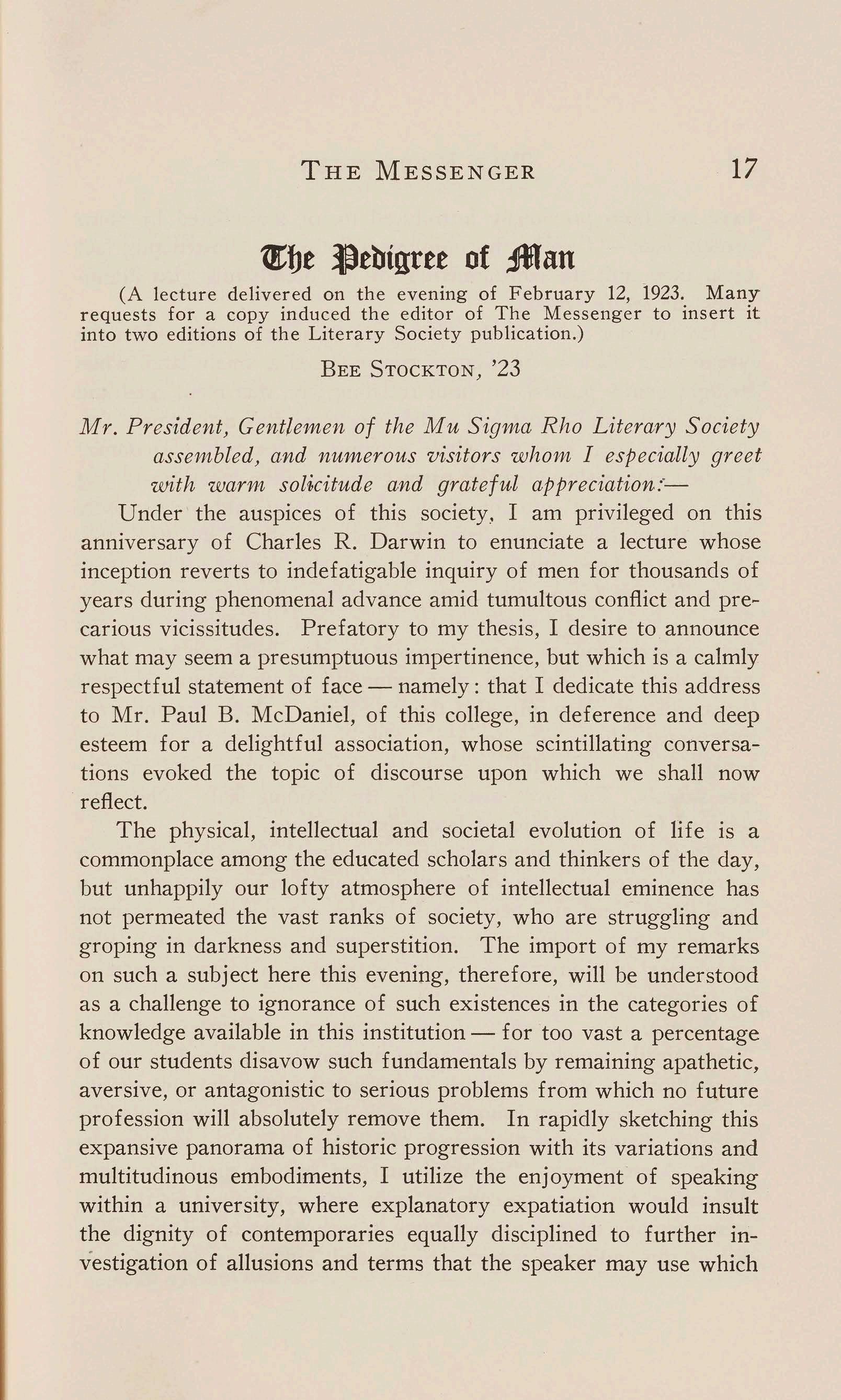
1ibe ftebtgreeof Jllan
(A lecture delivered on the evening of February 12, 1923. Many requests for a copy induced the editor of The Messenger to insert it into two editions of the Literary Society publication .)
BEE STOCKTON, '23
Mr. President, Gentlemen of the Mu Sigma Rho Literary Society assembled , and numerous visitors whom I especially greet with warm solicitude and grateful appreciation :· -
Under the auspices of this society, I am privileged on this anniversary of Charles R. Darwin to enunciate a lecture whose inception reverts to indefatigable inquiry of men for thousands of years during phenomenal advance amid tumultous conflict and precarious vicissitudes. Prefatory to my thesis, I desire to announce what may seem a presumptuous impertinence, but which is a calmly respectful statement of face -namely : that I dedicate this address to Mr. Paul B. McDaniel, of this college, in deference and deep esteem for a delightful association, whose scintillating conversations evoked the topic of discourse upon which we shall now reflect.
The physical, intellectual and societal evolution of life is a commonplace among the educated scholars and thinkers of the day, but unhappily our lofty atmosphere of intellectual eminence has not permeated the vast ranks of society, who are struggling and groping in darkness and superstition. The import of my remarks on such a subject here this evening, therefore, will be understood as a challenge to ignorance of such existences in the categories of knowledge available in this institution -for too vast a percentage of our students disavow such fundamentals by remaining apathetic, aversive, or antagonistic to serious problems from which no future profession will absolutely remove them. In rapidly sketching this expansive panorama of historic progression with its variations and multitudinous embodiments, I utilize the enjoyment of speaking within a university, where explanatory expatiation would insult the dignity of contemporaries equally disciplined to further investigation of allusions and terms that the speaker may use which
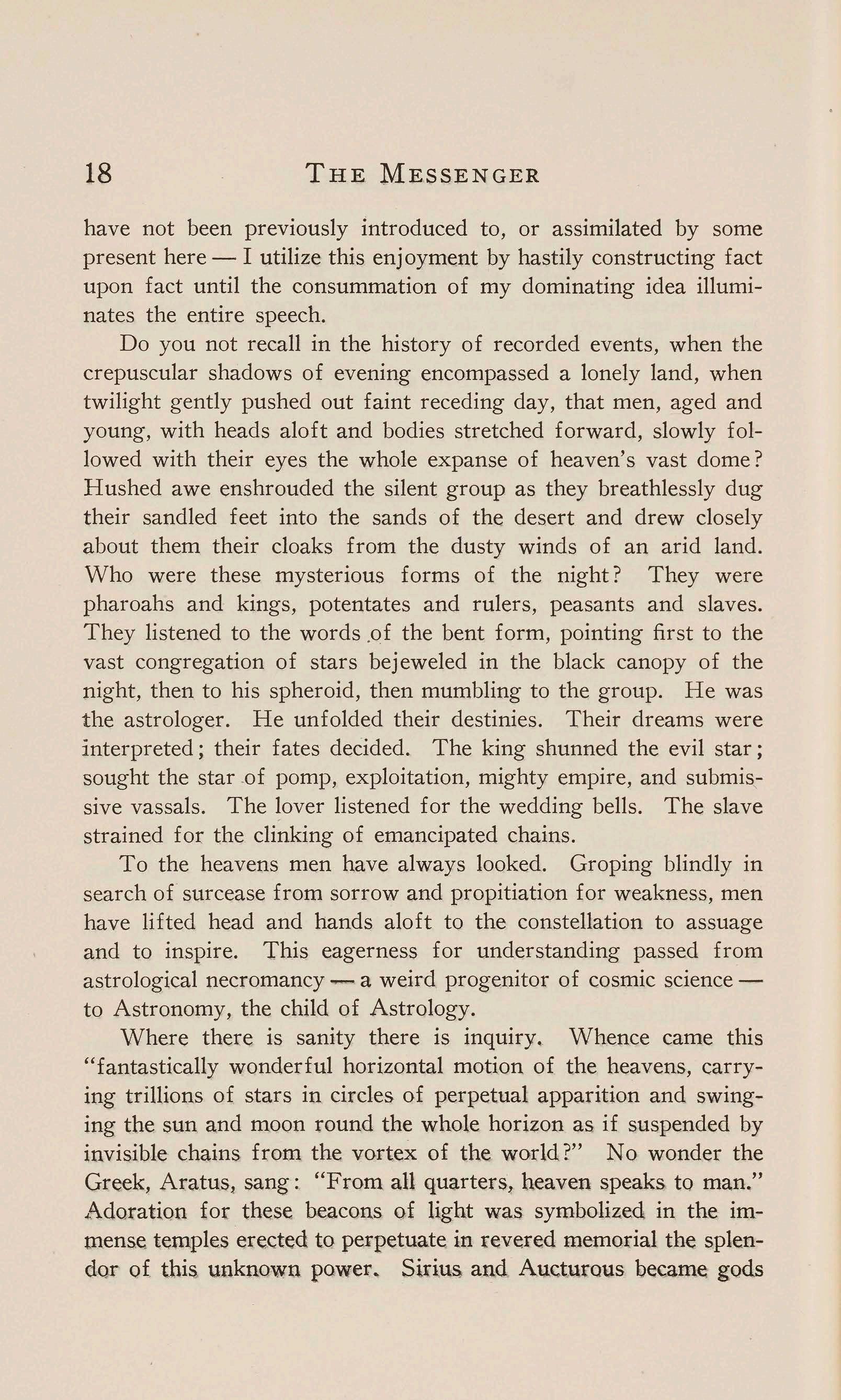
THE MESSENGER
have not been previously introduced to, or assimilated by some present here -I utilize this enjoyment by hastily constructing fact upon fact until the consummation of my dominating idea illuminates the entire speech.
Do you not recall in the history of recorded events, when the crepuscular shadows of evening encompassed a lonely land, when twilight gently pushed out faint receding day, that men, aged and young, with heads aloft and bodies stretched forward, slowly followed with their eyes the whole expanse of heaven's vast dome? Hushed awe enshrouded the silent group as they breathlessly dug their sandled feet into the sands of the desert and drew closely about them their cloaks from the dusty winds of an arid land. Who were these mysterious forms of the night? They were pharoahs and kings, potentates and rulers, peasants and slaves. They listened to the words .of the bent form, pointing first to the vast congregation of stars bejeweled in the black canopy of the night, then to his spheroid, then mumbling to the group. He was the astrologer. He unfolded their destinies. Their dreams were interpreted ; their fates decided. The king shunned the evil star ; sought the star of pomp, exploitation, mighty empire, and submissive vassals. The lover listened for the wedding bells. The slave strained for the clinking of emancipated chains.
To the heavens men have always looked. Groping blindly in search of surcease from sorrow and propitiation for weakness, men have lifted head and hands aloft to the constellation to assuage and to inspire. This eagerness for understanding passed from astrological necromancy - a weird progenitor of cosmic scienceto Astronomy, the child of Astrology.
Where there is sanity there is inquiry. Whence came this "fantastically wonderful horizontal motion of the heavens, carrying trillions of stars in circles of perpetual apparition and swinging the sun and moon round the whole horizon as if suspended by invisible chains from the vortex of the world?" No wonder the Greek, Aratust sang: "From all quarters, heaven speaks to man." Adoration for these beacons of light was symbolized in the immens.e temples erected to perpetuate in revered memorial the splendor of thi& unknown power. Sirius and Auc,tu.rous became gods
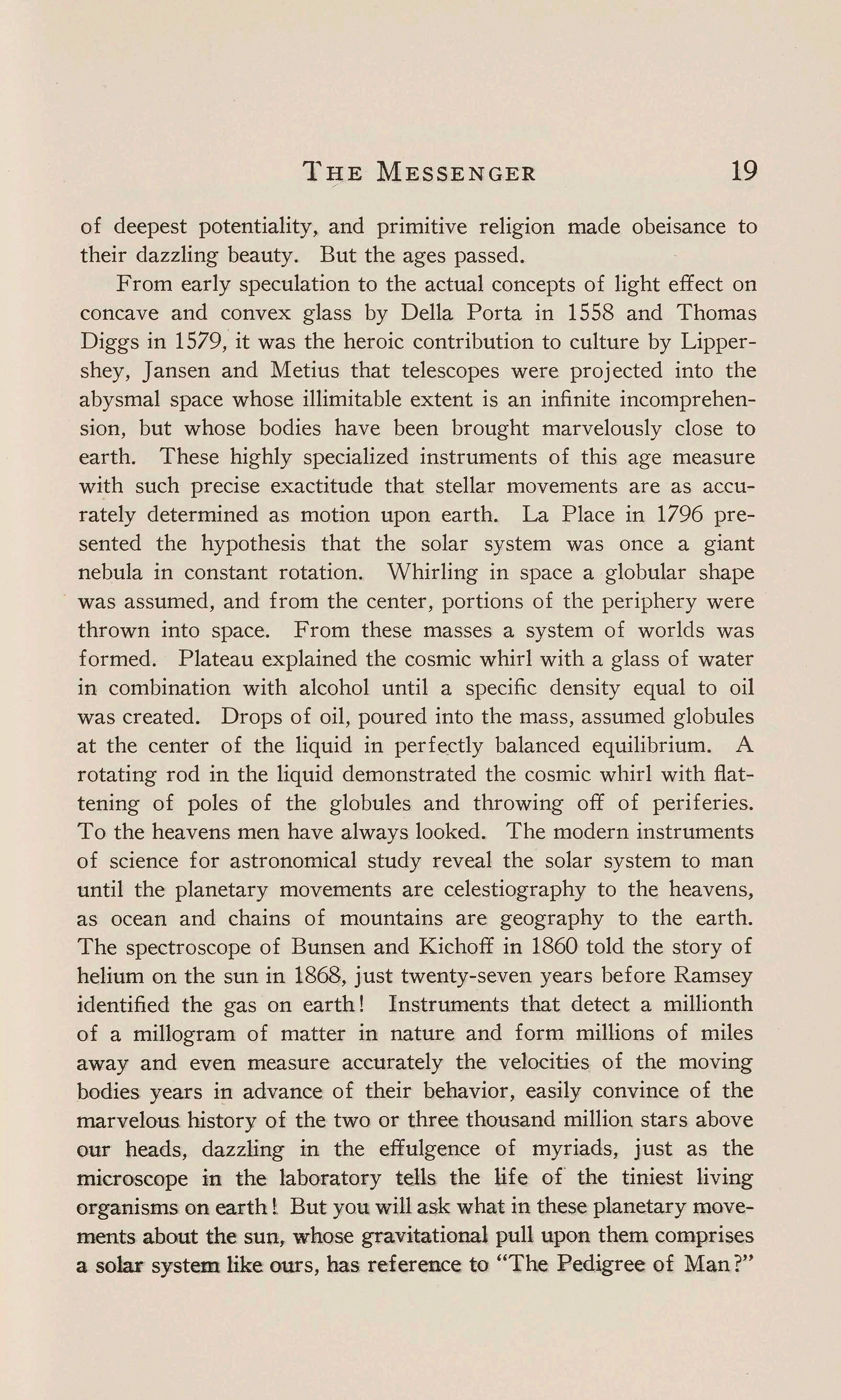
of deepest potentiality, and primitive religion made obeisance to their dazzling beauty. But the ages passed.
From early speculation to the actual concepts of light effect on concave and convex glass by Della Porta in 1558 and Thomas Diggs in 1579, it was the heroic contribution to culture by Lippershey, Jansen and Metius that telescopes were projected into the abysmal space whose illimitable extent is an infinite incomprehension, but whose bodies have been brought marvelously close to earth. These highly specialized instruments of this age measure wi th such precise exactitude that stellar movements are as accurately determined as motion upon earth. La Place in 1796 presented the hypothesis that the solar system was once a giant nebula in constant rotation. Whirling in space a globular shape was assumed, and from the center, portions of the periphery were thrown into space. From these masses a system of worlds was formed. Plateau explained the cosmic whirl with a glass of water in combination with alcohol until a specific density equal to oil was created. Drops of oil, poured into the mass, assumed globules at the center of the liquid in perfe ctly balanced equilibrium. A rotating rod in the liquid demonstrated the cosmic whirl with flattening of poles of the globules and throwing off of periferies. To the heavens men have always looked. The modern instruments of science for astronomical study reveal the solar system to man until the planetary movements are celestiography to the heavens, as ocean and chains of mountains are geography to the earth. The spectroscope of Bunsen and Kichoff in 1860 told the story of helium on the sun in 1868, just twenty-seven years before Ramsey identified the gas on earth! Instruments that detect a millionth of a millogram of matter in nature and form millions of miles away and even measure accurately the velocities of the moving bodies years i!} advance of their behavior, easily convince of the marvelous history of the two or three thousand million stars above our heads, dazzling in the effulgence of myriads, just as the microscope in the laboratory tells the life of the tiniest living organisms on earth l But you will ask what in these planetary movements about the sun, whose gravitational pull upon them comprises a solar system like ours, has reference to "The Pedigree of Man?"
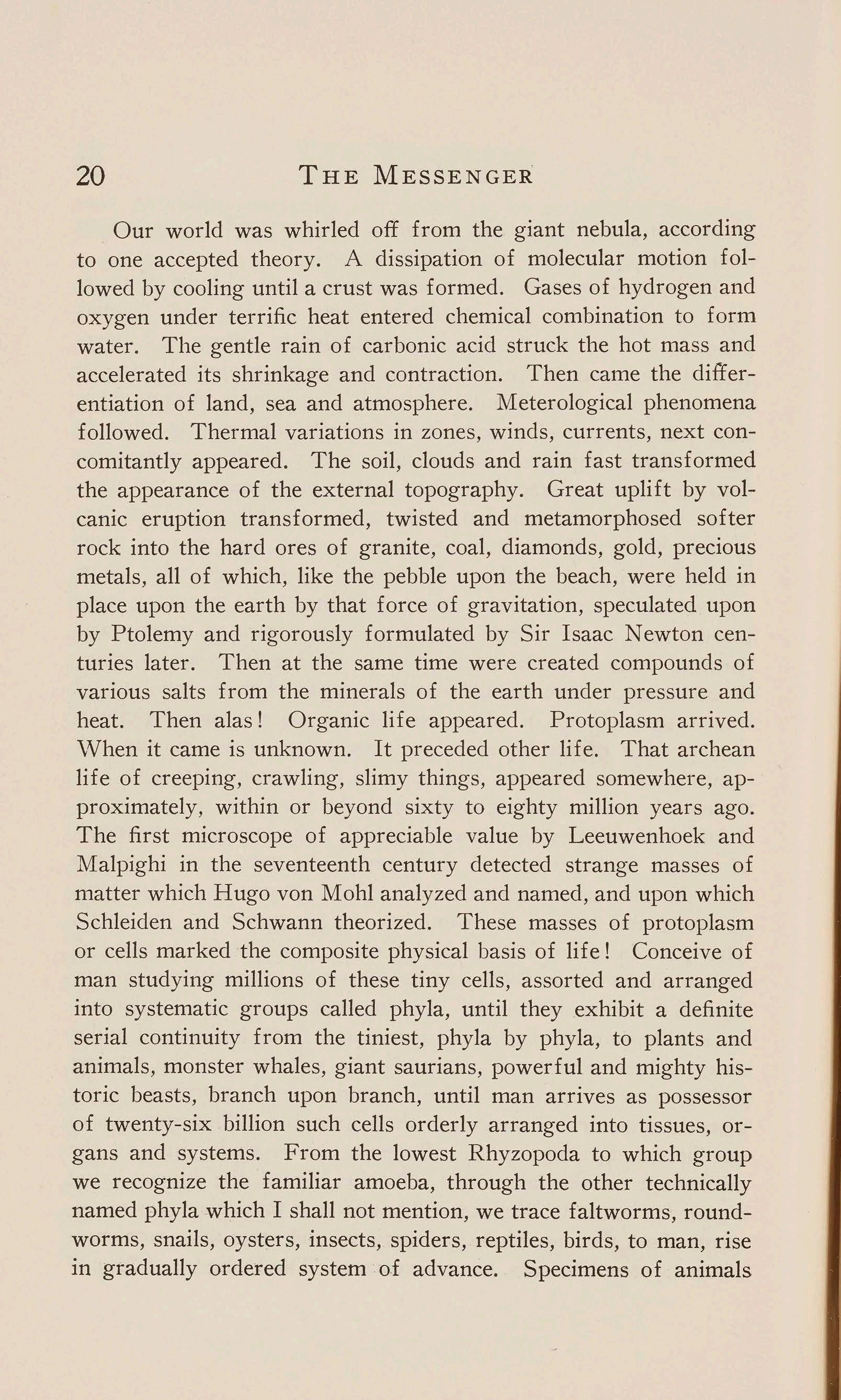
THE MESSENGER
Our world was whirled off from the giant nebula, according to one accepted theory. A dissipation of molecular motion followed by cooling until a crust was formed. Gases of hydrogen and oxygen under terrific heat entered chemical combination to form water. The gentle rain of carbonic acid struck the hot mass and accelerated its shrinkage and contraction. Then came the differentiation of land, sea and atmosphere. Meterological phenomena followed. Thermal variations in zones, winds, currents, next concomitantly appeared. The soil, clouds and rain fast transformed the appearance of the external topography. Great uplift by volcanic eruption transformed, twisted and metamorphosed softer rock into the hard ores of granite, coal, diamonds, gold, precious metals, all of which, like the pebble upon the beach, were held in place upon the earth by that force of gravitation, speculated upon by Ptolemy and rigorously formulated by Sir Isaac Newton centuries later. Then at the same time were created compounds of various salts from the minerals of the earth under pressure and heat. Then alas! Organic life appeared. Protoplasm arrived. \Vhen it came is unknown. It preceded other life. That archean life of creeping, crawling, slimy things, appeared somewhere, approximately, within or beyond sixty to eighty million years ago. The first microscope of appreciable value by Leeuwenhoek and Malpighi in the seventeenth century detected strange masses of matter which Hugo von Mohl analyzed and named, and upon which Schleiden and Schwann theorized. These masses of protoplasm or cells marked the composite physical basis of life! Conceive of man studying millions of these tiny cells, assorted and arranged into systematic groups called phyla, until they exhibit a definite serial continuity from the tiniest, phyla by phyla, to plants and animals, monster whales, giant saurians, powerful and mighty historic beasts, branch upon branch, until man arrives as possessor of twenty-six billion such cells orderly arranged into tissues, organs and systems. From the lowest Rhyzopoda to which group we recognize the familiar amoeba, through the other technically named phyla which I shall not mention, we trace faltworms, roundworms, snails, oysters, insects, spiders, reptiles, birds, to man, rise in gradually ordered system of advance. Specimens of animals
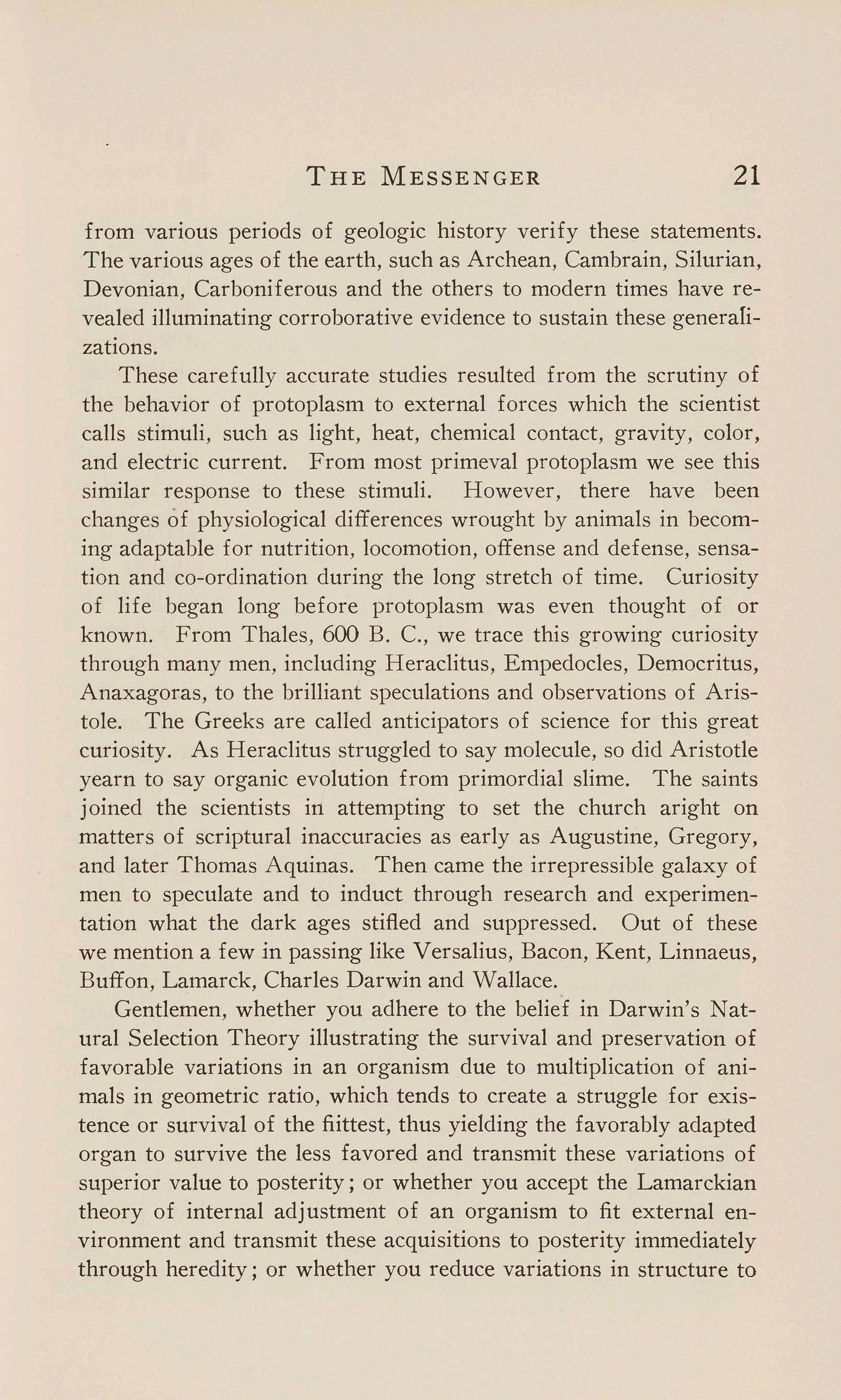
from various periods of geologic history verify these statements. The various ages of the earth, such as Archean, Cambrain, Silurian, Devonian, Carboniferous and the others to modern times have revealed illuminating corroborative evidence to sustain these generalizations.
These carefully accurate studies resulted from the scrutiny of the behavior of protoplasm to external forces which the scientist calls stimuli, such as light, heat, chemical contact, gravity, color, and electric current. From most primeval protoplasm we see this similar response to these stimuli. However, there have been changes of physiological differences wrought by animals in becoming adaptable for nutrition, locomotion, offense and defense, sensation and co-ordination during the long stretch of time. Curiosity of life began long before protoplasm was even thought of or known. From Thales, 600 B. C., we trace this growing curiosity through many men, including Heraclitus, Empedocles, Democritus, Anaxagoras, to the brilliant speculations and observations of Aristole. The Greeks are called anticipators of science for this great curiosity. As Heraclitus struggled to say molecule, so did Aristotle yearn to say organic evolution from primordial slime. The saints joined the scientists in attempting to set the church aright on matters of scriptural inaccuracies as early as Augustine, Gregory, and later Thomas Aquinas. Then came the irrepressible galaxy of men to speculate and to induct through research and experimentation what the dark ages stifled and suppressed. Out of these we mention a few in passing like Versalius, Bacon, Kent, Linnaeus, Buffon, Lamarck, Charles Darwin and Wallace.
Gentlemen, whether you adhere to the belief in Darwin's Natural Selection Theory illustrating the survival and preservation of favorable variations in an organism due to multiplication of animals in geometric ratio, which tends to create a struggle for existence or survival of the fiittest, thus yielding the favorably adapted organ to survive the less favored and transmit these variations of superior value to posterity; or whether you accept the Lamarckian theory of internal adjustment of an organism to fit external environment and transmit these acquisitions to posterity immediately through heredity; or whether you reduce variations in structure to
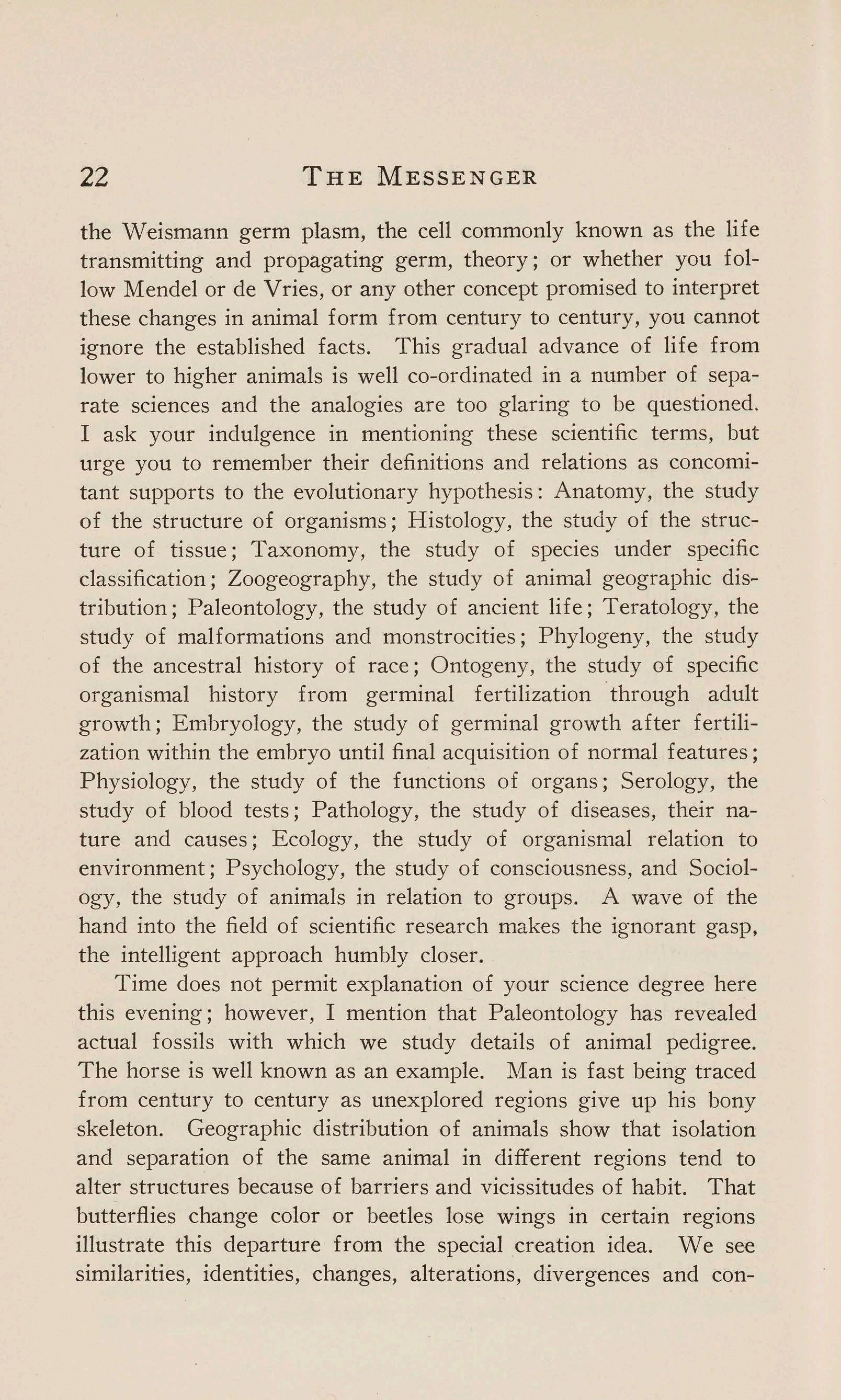
THE MESSENGER
the Weismann germ plasm, the cell commonly known as the life transmitting and propagating germ, theory; or whether you follow Mendel or de Vries, or any other concept promised to interpret these changes in animal form from century to century, you cannot ignore the established facts. This gradual advance of life from lower to higher animals is well co-ordinated in a number of separate sciences and the analogies are too glaring to be questioned. I ask your indulgence in mentioning these scientific terms, but urge you to remember their definitions and relations as concomitant supports to the evolutionary hypothesis: Anatomy, the study of the structure of organisms; Histology, the study of the structure of tissue; Taxonomy, the study of species under specific classification; Zoogeography, the study of animal geographic distribution; Paleontology, the study of ancient life; Teratology, the study of malformations and monstrocities; Phylogeny, the study of the ancestral history of race; Ontogeny, the study of specific organismal history from germinal fertilization through adult growth; Embryology, the study of germinal growth after fertilization within the embryo until final acquisition of normal features; Physiology, the study of the functions of organs; Serology, the study of blood tests; Pathology, the study of diseases, their nature and causes; Ecology, the study of organismal relation to environment; Psychology, the study of consciousness, and Sociology, the study of animals in relation to groups . A wave of the hand into the field of scientific research makes the ignorant gasp, the intelligent approach humbly closer.
Time does not permit explanation of your science degree here this evening; however, I mention that Paleontology has revealed actual fossils with which we study details of animal pedigree. The horse is well known as an example. Man is fast being traced from century to century as unexplored regions give up his bony skeleton. Geographic distribution of animals show that isolation and separation of the same animal in different regions tend to alter structures because of barriers and vicissitudes of habit. That butterflies change color or beetles lose wings in certain regions illustrate this departure from the special creation idea. We see similarities, identities, changes, alterations, divergences and con-
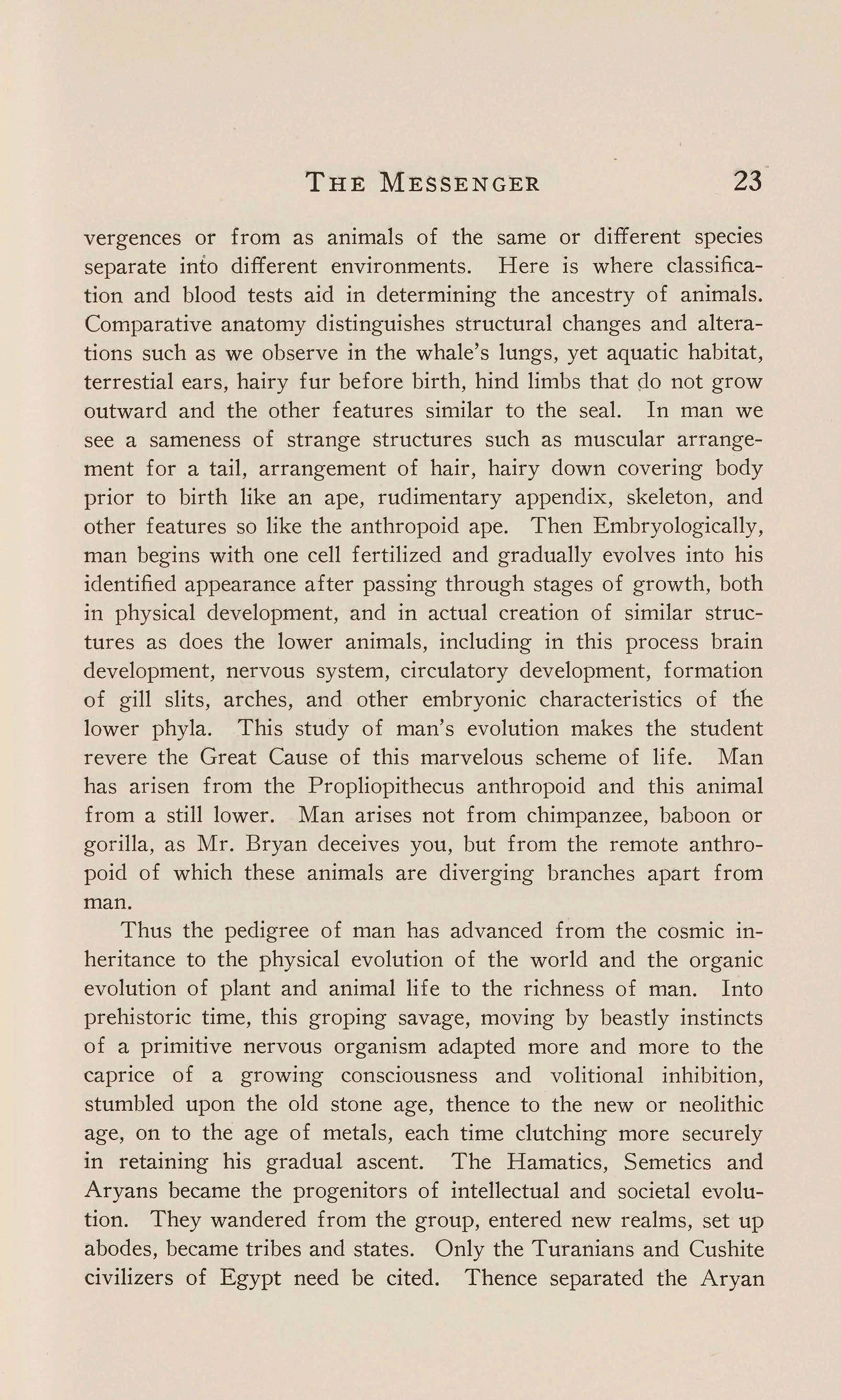
vergences or from as animals of the same or different species separate info different environments. Here is where classification and blood tests aid in determining the ancestry of animals. Comparative anatomy distinguishes structural changes and alterations such as we observe in the whale's lungs, yet aquatic habitat, terrestial ears, hairy fur before birth, hind limbs that do not grow outward and the other f ea tu res similar to the seal. In man we see a sameness of strange structures such as muscular arrangement for a tail, arrangement of hair, hairy down covering body prior to birth like an ape, rudimentary appendix, skeleton, and other features so like the anthropoid ape. Then Embryologically, man begins with one cell fertilized and gradually evolves into his identified appearance after passing through stages of growth, both in physical development, and in actual creation of similar structures as does the lower animals, including in this process brain development, nervous system, circulatory development, formation of gill slits, arches, and other embryonic characteristics of the lower phyla. This study of man's evolution makes the student revere the Great Cause of this marvelous scheme of life. Man has arisen from the Propliopithecus anthropoid and this animal from a still lower. Man arises not from chimpanzee, baboon or gorilla, as Mr. Bryan deceives you, but from the remote anthropoid of which these animals are diverging branches apart from man.
Thus the pedigree of man has advanced from the cosmic inheritance to the physical evolution of the world and the organic evolution of plant and animal life to the richness of man. Into prehistoric time, this groping savage, moving by beastly instincts of a primitive nervous organism adapted more and more to the caprice of a growing consciousness and volitional inhibition, stumbled upon the old stone age, thence to the new or neolithic age, on to the age of metals, each time clutching more securely in retaining his gradual ascent. The Hamatics, Semetics and Aryans became the progenitors of intellectual and societal evolution. They wandered from the group, entered new realms, set up abodes, became tribes and states. Only the Turanians and Cushite civilizers of Egypt need be cited. Thence separated the Aryan
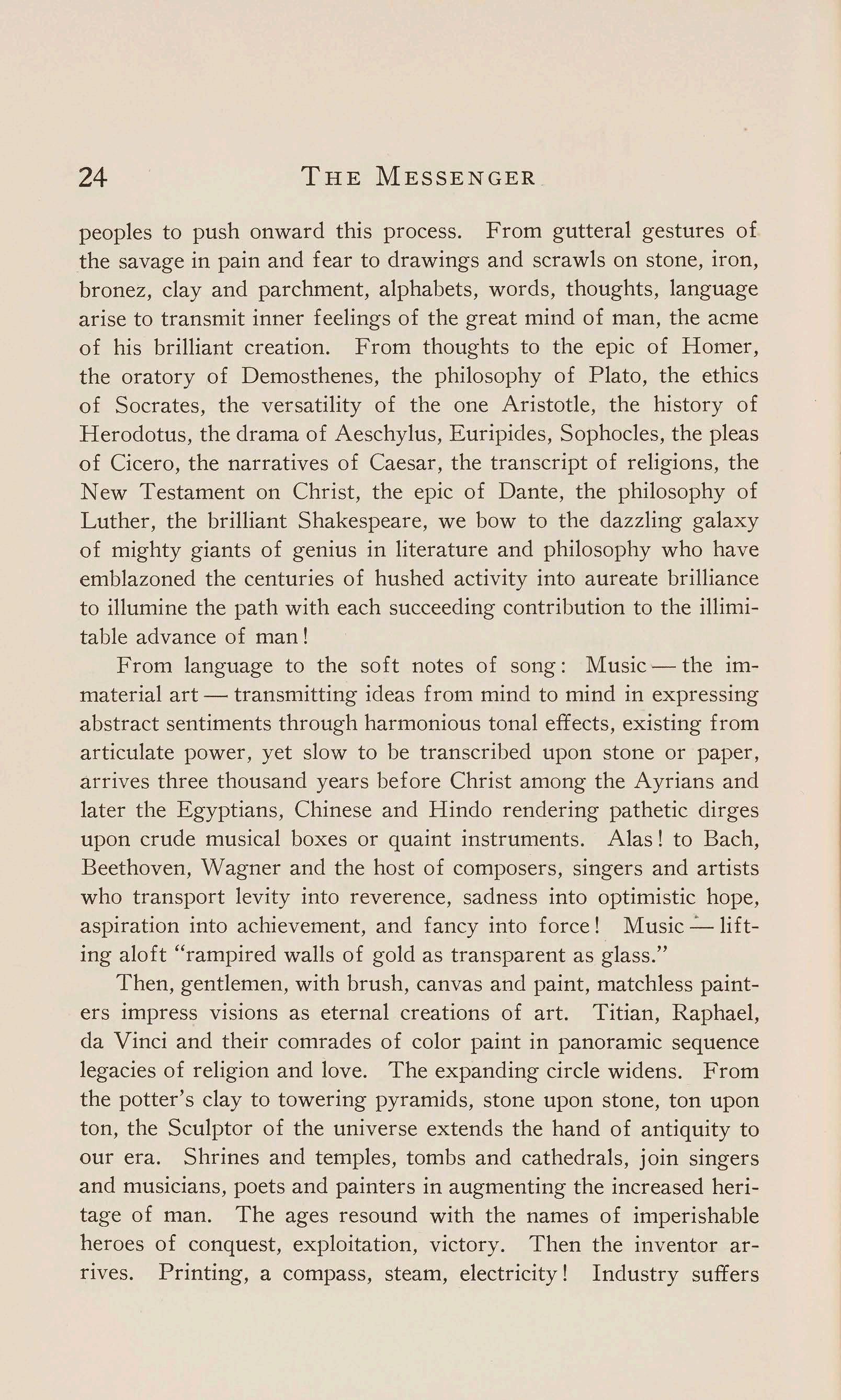
THE MESSENGER
peoples to push onward this process. From gutteral gestures of the savage in pain and fear to drawings and scrawls on stone, iron, bronez, clay and parchment, alphabets, words, thoughts, language arise to transmit inner feelings of the great mind of man, the acme of his brilliant creation. From thoughts to the epic of Homer, the oratory of Demosthenes, the philosophy of Plato, the ethics of Socrates, the versatility of the one Aristotle, the history of Herodotus, the drama of Aeschylus, Euripides, Sophocles, the pleas of Cicero, the narratives of Caesar, the transcript of religions, the New Testament on Christ, the epic of Dante, the philosophy of Luther, the brilliant Shakespeare, we bow to the dazzling galaxy of mighty giants of genius in literature and philosophy who have emblazoned the centuries of hushed activity into aureate brilliance to illumine the path with each succeeding contribution to the illimitable advance of man!
From language to the soft notes of song: Music - the immaterial art - transmitting ideas from mind to mind in expressing abstract sentiments through harmonious tonal effects, existing from articulate power, yet slow to be transcribed upon stone or paper, arrives three thousand years before Christ among the Ayrians and later the Egyptians, Chinese and Hindo rendering pathetic dirges upon crude musical boxes or quaint instruments. Alas ! to Bach, Beethoven, Wagner and the host of composers, singers and artists who transport levity into reverence, sadness into optimistic hope, aspiration into achievement, and fancy into force! Music..:__lifting aloft "rampired walls of gold as transparent as glass."
Then, gentlemen, with brush, canvas and paint, matchless painters impress visions as eternal creations of art. Titian, Raphael, da Vinci and their comrades of color paint in panoramic sequence legacies of religion and love. The expanding circle widens. From the potter's clay to towering pyramids, stone upon stone, ton upon ton, the Sculptor of the universe extends the hand of antiquity to our era. Shrines and temples, tombs and cathedrals, join singers and musicians, poets and painters in augmenting the increased heritage of man. The ages resound with the names of imperishable heroes of conquest, exploitation, victory. Then the inventor arrives. Printing, a compass, steam, electricity! Industry suffers
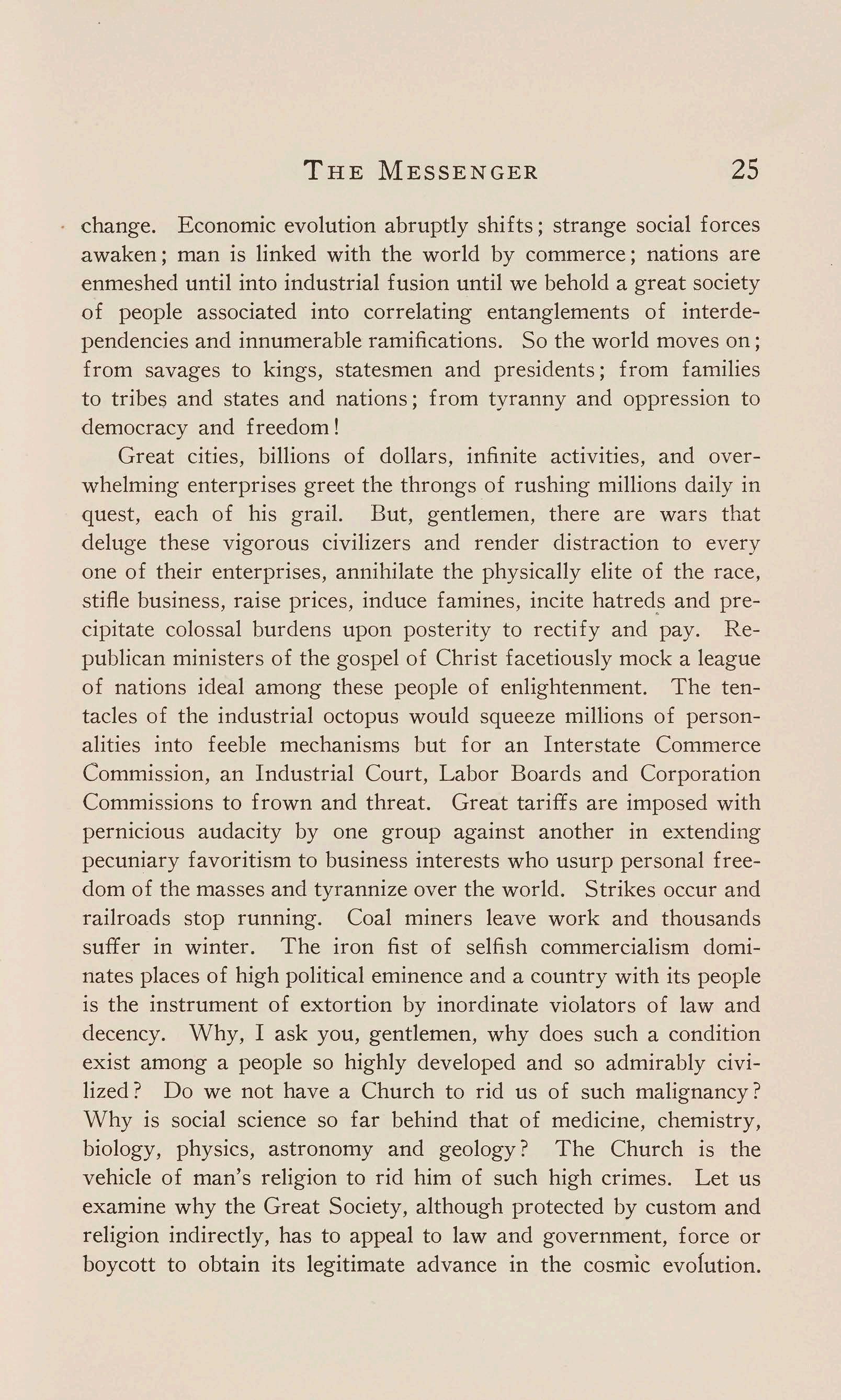
change. Economic evolution abruptly shifts; strange social forces awaken; man is linked with the world by commerce; nations are enmeshed until into industrial fusion until we behold a great society of people associated into correlating entanglements of interdependencies and innumerable ramifications. So the world moves on ; from savages to kings, statesmen and presidents; from families to tribes and states and nations; from tyranny and oppression to democracy and freedom !
Great cities, billions of dollars, infinite activities, and overwhelming enterprises greet the throngs of rushing millions daily in quest, each of his grail. But , gentlemen, there are wars that deluge these vigorous civilizers and render distraction to every one of their enterprises, annihilate the physically elite of the race, stifle business, raise prices, induce famines , incite hatred s and precipitate colossal burdens upon posterity to rectify and pay. Republican ministers of the gospel of Christ facetiously mock a league of nations ideal among these people of enlightenment. The tentacles of the industrial octopus would squeeze millions of personalities into feeble mechanisms but for an Interstate Commerce Commission, an Industrial Court, Labor Boards and Corporation Commissions to frown and threat. Great tariffs are imposed with pernicious audacity by one group against another in extending pecuniary favoritism to business interests who usurp personal freedom of the masses and tyrannize over the world. Strikes occur and railroads stop running. Coal miners leave work and thousands suffer in winter. The iron fist of selfish commercialism dominates places of high political eminence and a country with its people is the instrument of extortion by inordinate violators of law and decency. Why, I ask you, gentlemen, why does such a condition exist among a people so highly developed and so admirably civilized? Do we not have a Church to rid us of such malignancy? vVhy is social science so far behind that of medicine, chemistry, biology, physics, astronomy and geology? The Church is the vehicle of man's religion to rid him of such high crimes. Let us examine why the Great Society, although protected by custom and religion indirectly, has to appeal to law and government, force or boycott to obtain its legitimate advance in the cosmic evofution.
THE MESSENGER
Gentlemen, as high as my respect for the Church is, I am grieved to say that such conditions pointedly imply an unhappy weakness that must be corrected in this longest single institution of continuous functioning for specific ·racial improvement. Religion evidently fails to fit the age. This is a false concept of religion under an ecclesiastical guise of the Church. The Church can no longer lag behind the great sciences of the universe. Religion is scientific and is evolutionary. The Church has a place in the pedigree of man. Let the Church examine itself, then let the Church ask why it has attempted to remain aloof from the great process?
(To Be Concluded)
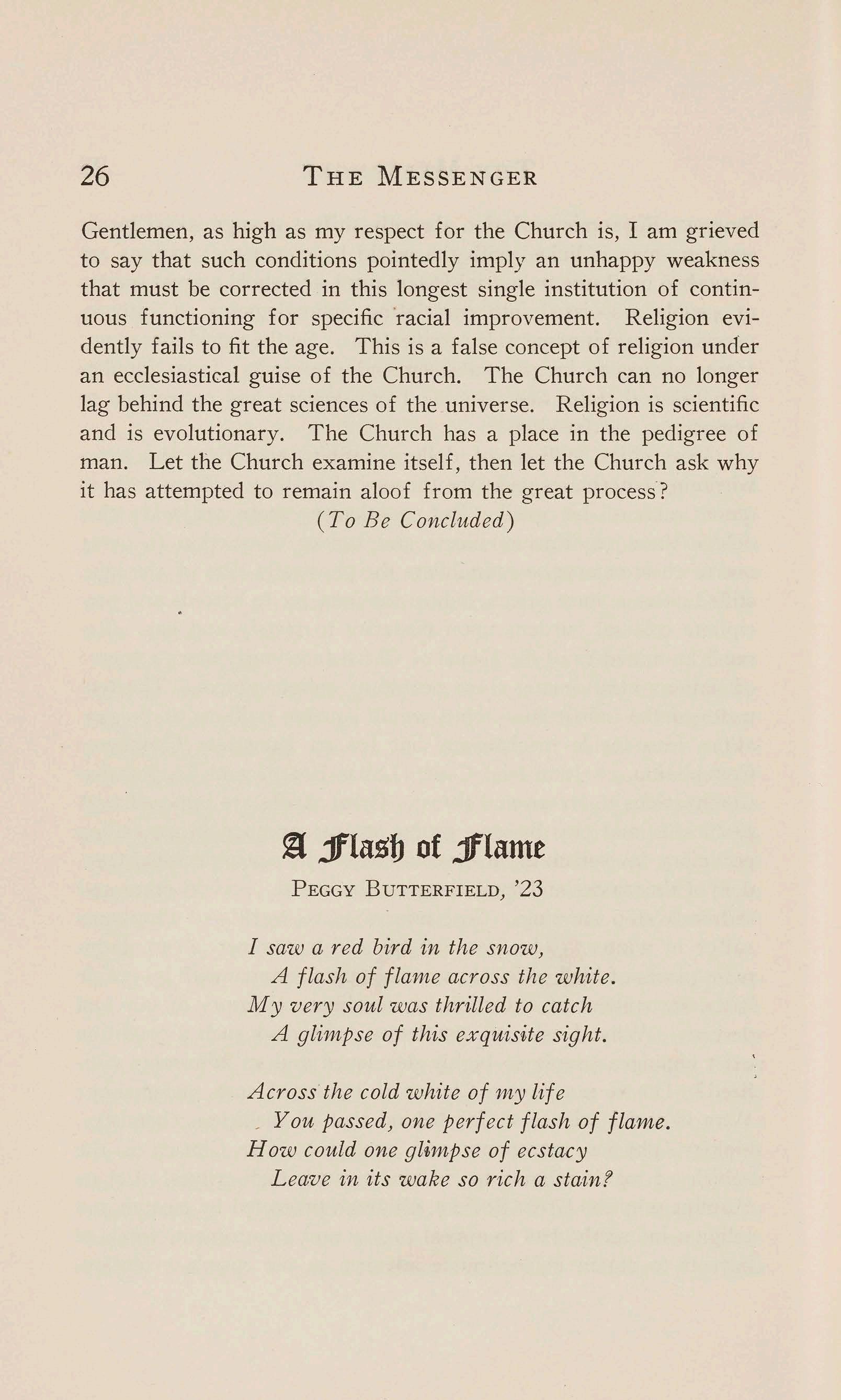
jfla~b of jflame
PEGGY BUTTERFIELD, '23
I saw a red bird in the snow, A flash of flame across the white. My very soul was thrilled to catch A glimpse of this exquisite sight.
Across the cold white of my life
_ You passed, one perfect flash of flame. How could one glimpse of ecstacy Leave in its wake so rich a stain?
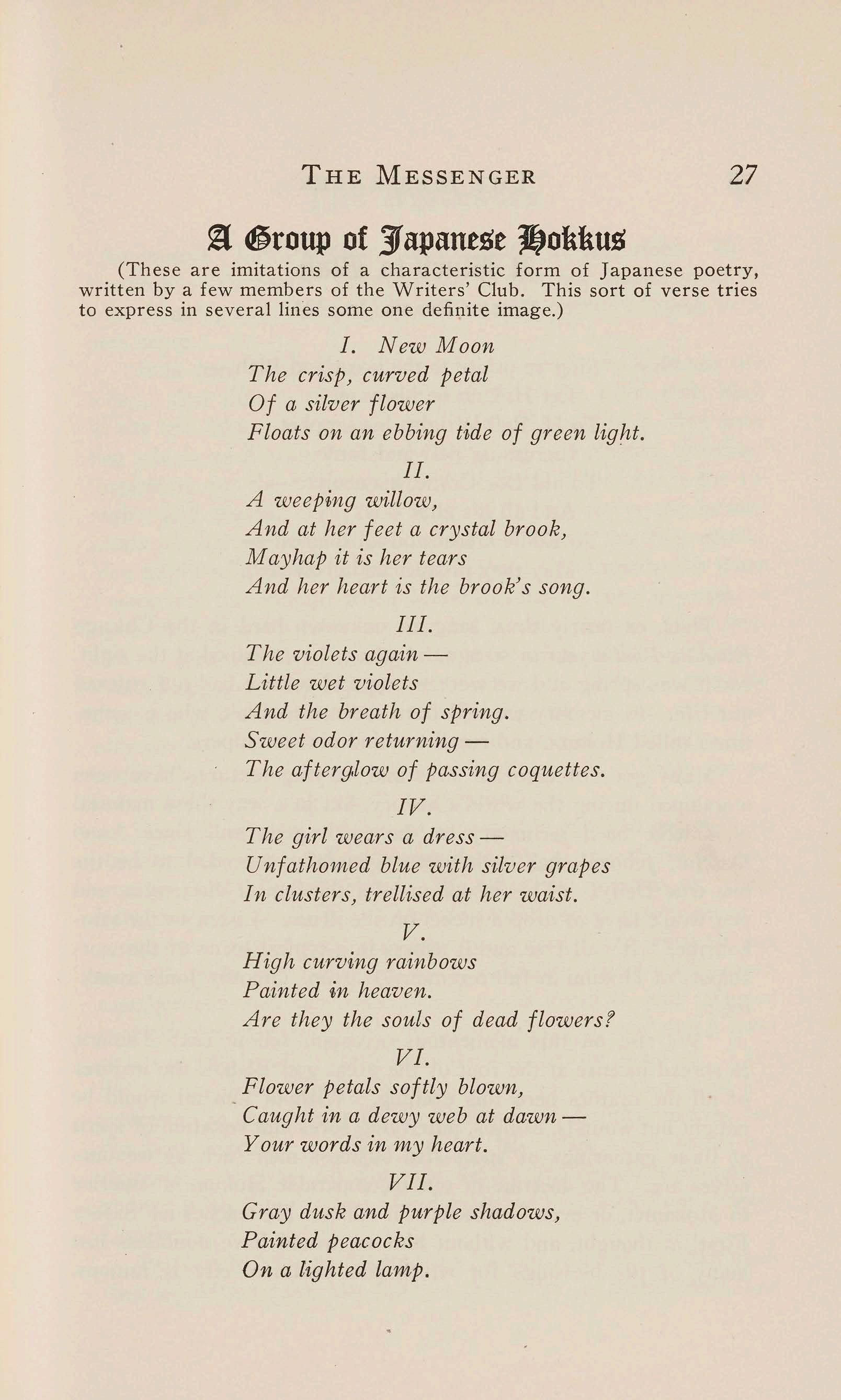
a ~roup of Jfapanc~cJ,okku~
(These are imitations of a characteristic form of Japanese poetry, written by a few members of the Writers' Club. This sort of verse tries to express in several lines some one definite image.)
I. New Moon
The crisp, curved petal Of a silver flower Floats on an ebbing tide of green light.
II.
A weeping willow, And at her feet a crystal brook, Mayhap it is her tears And her heart is the brook's song.
Ill.
The violets againLittle wet violets And the breath of spring. Sweet odor returningThe afterglow of passing coquettes.
IV.
The girl wears a dressUnfathomed blue with silver grapes In clusters, trellised at her waist.
V.
High curving rainbows Painted in heaven. Are they the souls of dead flowers?
VI.
Flower petals softly blown, Caught in a dewy web at dawny our words in my heart.
VII.
Gray dusk and purple shadows, Painted peacocks On a lighted lamp.
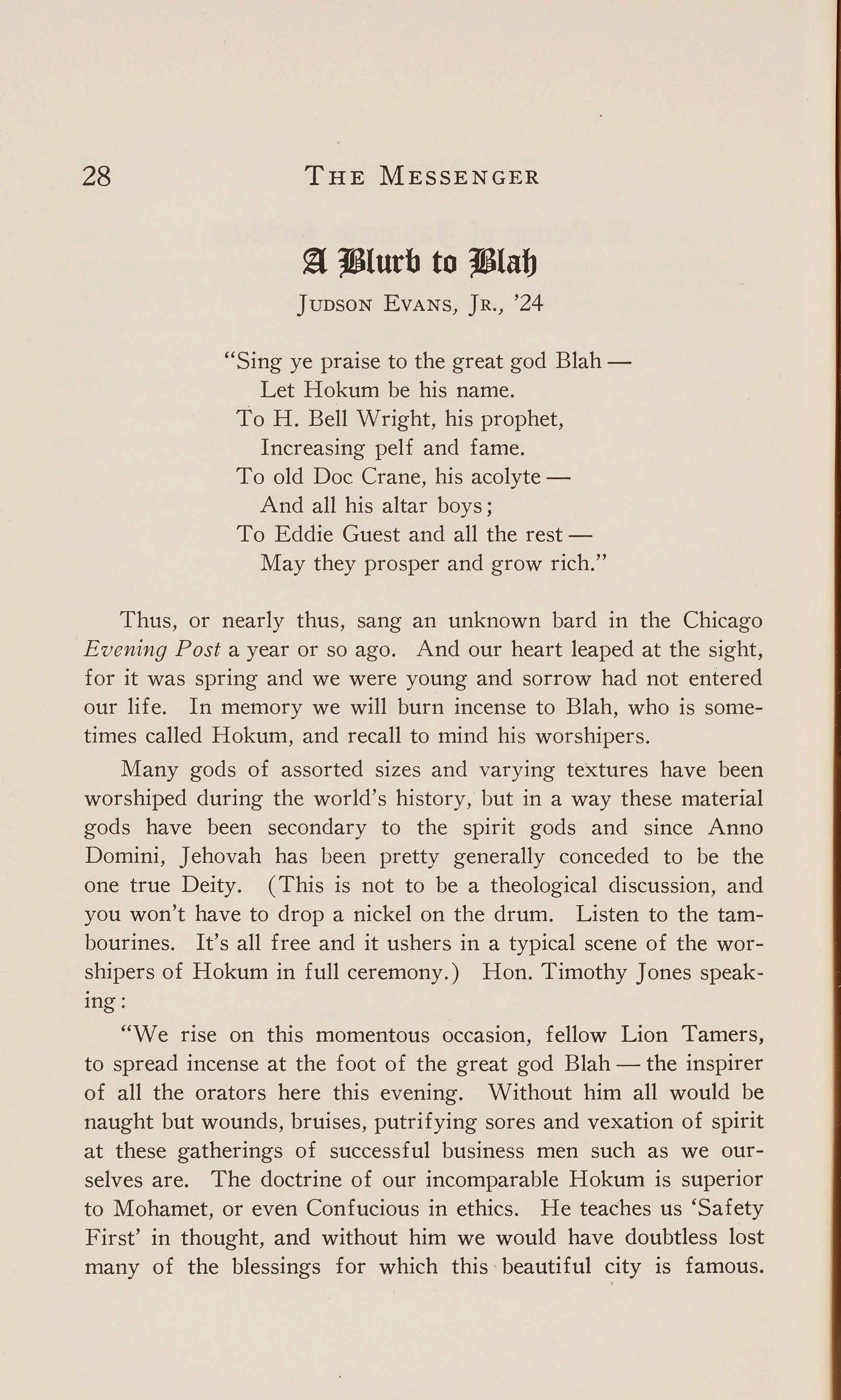
a Jjlurbto Jjlab
JUDSON EVANS, JR., '24
"Sing ye praise to the great god BlahLet Hokum be his name.
To H. Bell Wright, his prophet, Increasing pelf and fame.
To old Doc Crane , his acolyteAnd all his altar boys;
To Eddie Guest and all the restMay they prosper and grow rich."
Thus, or nearly thus, sang an unknown bard in the Chicago Evening Post a year or so ago. And our heart leaped at the sight, for it was spring and we were young and sorrow had not entered our life. In memory we will burn incense to Blah, who is sometimes called Hokum, and recall to mind his worshipers.
Many gods of assorted sizes and varying textures have been worshiped during the world's history, but in a way these material gods have been secondary to the spirit gods and since Anno Domini, Jehovah has been pretty generally conceded to be the one true Deity. (This is not to be a theological discussion, and you won't have to drop a nickel on the drum. Listen to the tambourines. It's all free and it ushers in a typical scene of the worshipers of Hokum in full ceremony.) Hon. Timothy Jones speakmg:
"We rise on this momentous occasion, fellow Lion Tamers, to spread incense at the foot of the great god Blah -the inspirer of all the orators here this evening. Without him all would be naught but wounds, bruises , putrif ying sores and vexation of spirit at these gatherings of successful business men such as we ourselves are. The doctrine of our incomparable Hokum is superior to Mohamet, or even Confucious in ethics. He teaches us 'Safety First' in thought, and without him we would have doubtless lost many of the blessings for which this beautiful city is famous.
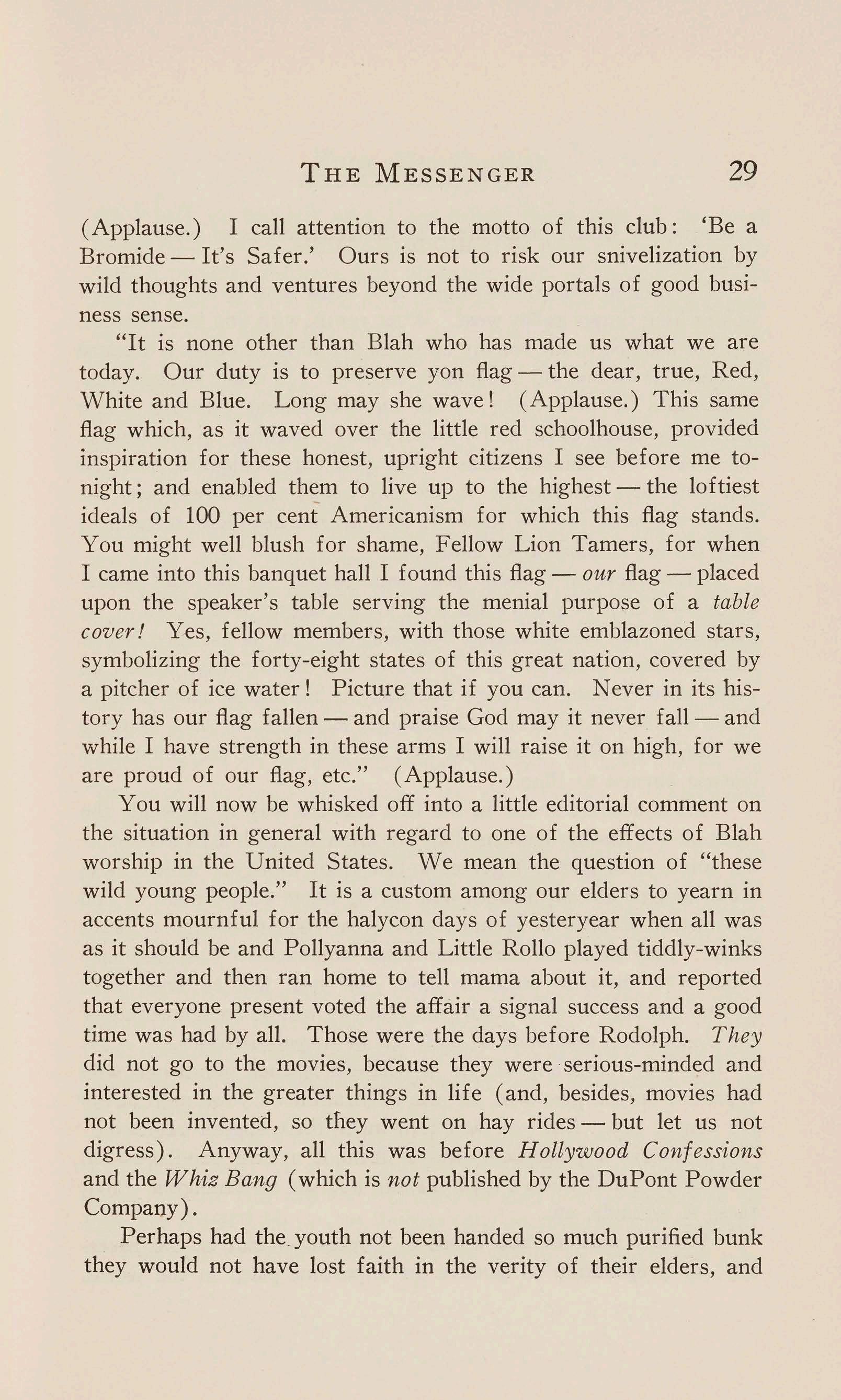
(Applause.) I caII attention to the motto of this club: 'Be a Bromide -It's Safer.' Ours is not to risk our snivelization by wild thoughts and ventures beyond the wide portals of good business sense.
"It is none other than Blah who has made us what we are today. Our duty is to preserve yon flag-the clear, true, Red, White and Blue. Long may she wave! (Applause.) This same flag which, as it waved over the little reel schoolhouse, provided inspiration for these honest, upright citizens I see before me tonight; and enabled them to live up to the highest -the Iof ti est ideals of 100 per cent Americanism for which this flag stands. You might weII blush for shame, FeIIow Lion Tamers, for when I came into this banquet haII I found this flag - our flag -placed upon the speaker's table serving the menial purpose of a table cover! Yes, feIIow members, with those white emblazoned stars, symbolizing the forty-eight states of this great nation, covered by a pitcher of ice water ! Picture that if you can. Never in its history has our flag faIIen -and praise Goel may it never faII -and while I have strength in these arms I wiII raise it on high, for we are proud of our flag, etc." (Applause.)
You will now be whisked off into a little editorial comment on the situation in general with regard to one of the effects of Blah worship in the United States. We mean the question of "these wild young people." It is a custom among our elders to yearn in accents mournful for the halycon days of yesteryear when aII was as it should be and PoIIyanna and Little RoIIo played tidclly-winks together and then ran home to teII mama about it, and reported that everyone present voted the affair a signal success and a good time was had by aII. Those were the clays before Rodolph. They did not go to the movies, because they were serious-minded and interested in the greater things in life ( and, besides, movies had not been invented, so they went on hay rides -but let us not digress). Anyway, all this was before Hollywood Confessions and the Whiz Bang ( which is not published by the DuPont Powder Company).
Perhaps had the youth not been handed so much purified bunk they would not have lost faith in the verity of their elders, and
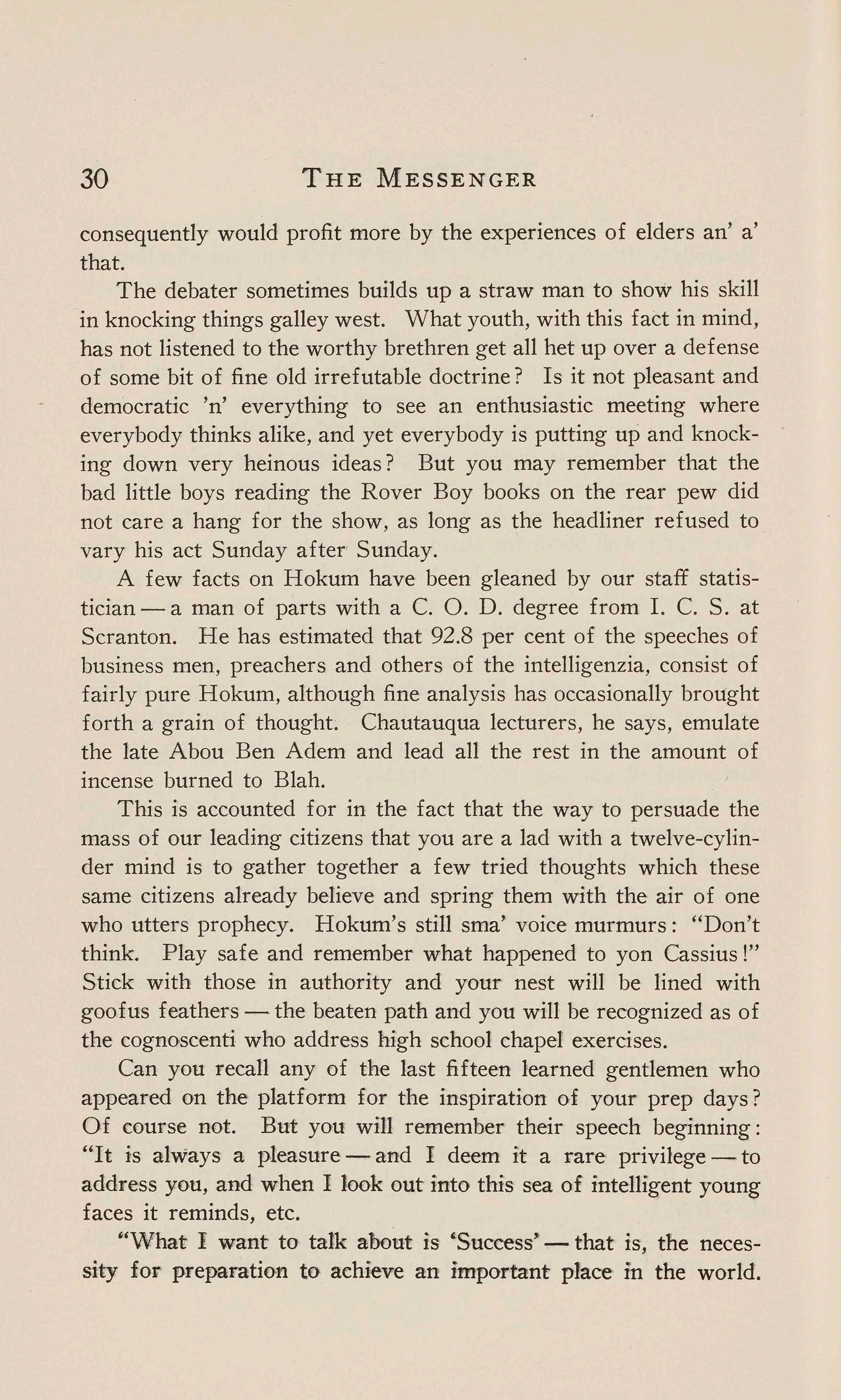
THE MESSENGER
consequently would profit more by the experiences of elders an' a' that.
The debater sometimes builds up a straw man to show his skill in knocking things galley west. What youth, with this fact in mind, has not listened to the worthy brethren get all het up over a defense of some bit of fine old irrefutable doctrine? Is it not pleasant and democratic 'n' everything to see an enthusiastic meeting where everybody thinks alike, and yet everybody is putting up and knocking down very heinous ideas? But you may remember that the bad little boys reading the Rover Boy books on the rear pew did not care a hang for the show, as long as the headliner refused to vary his act Sunday after Sunday.
A few facts on Hokum have been gleaned by our staff statistician - a man of parts with a C. 0. D. degree from I. C. S. at Scranton. He has estimated that 92.8 per cent of the speeches of business men, preachers and others of the intelligenzia, consist of fairly pure Hokum, although fine analysis has occasionally brought forth a grain of thought. Chautauqua lecturers, he says, emulate the late Abou Ben Adem and lead all the rest in the amount of incense burned to Blah.
This is accounted for in the fact that the way to persuade the mass of our leading citizens that you are a lad with a twelve-cylinder mind is to gather together a few tried thoughts which these same citizens already believe and spring them with the air of one who utters prophecy. Hokum's still sma' voice murmurs: "Don't think. Play safe and remember what happened to yon Cassius!" Stick with those in authority and your nest will be lined with goofus feathers -the beaten path and you will be recognized as of the cognoscenti who address high school chapel exercises.
Can you recall any of the last fifteen learned gentlemen who appeared on the platform for the inspiration of your prep days? Of course not. But you will remember their speech beginning: "It is always a pleasure-and I deem it a rare privilege - to address you, and when I look out into this sea of intelligent young faces it reminds, etc.
"What I want to talk about is 'Success• -that is, the necessity for preparation to achieve an important place in the world.
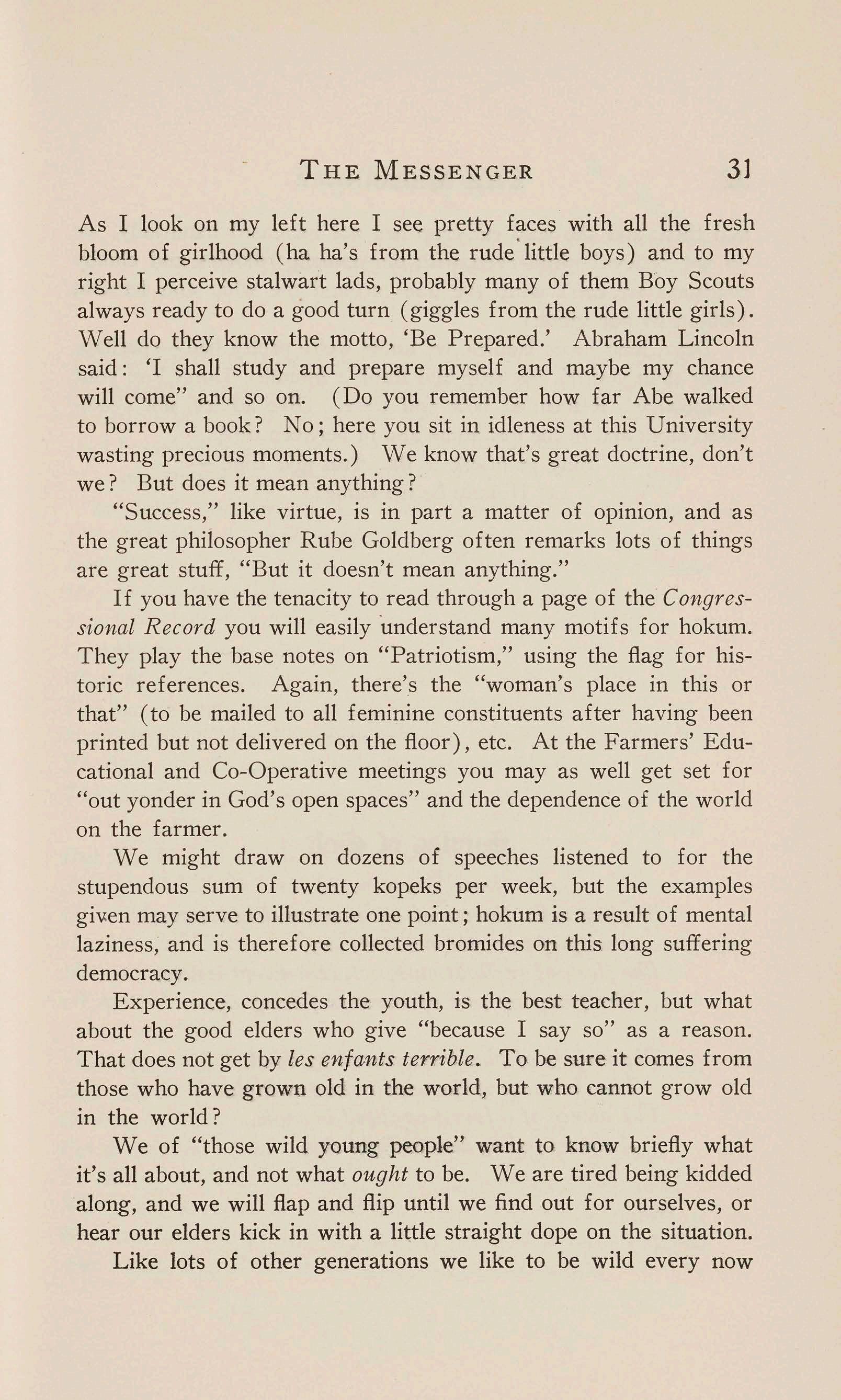
As I look on my left here I see pretty faces with all the fresh bloom of girlhood (ha ha's from the rude . little boys) and to my right I perceive stalwart lads, probably many of them Boy Scouts always ready to do a good turn (giggles from the rude little girls). Well do they know the motto, 'Be Prepared.' Abraham Lincoln said: 'I shall study and prepare myself and maybe my chance will come" and so on. ( Do you remember how far Abe walked to borrow a book? No; here you sit in idleness at this University wasting precious moments.) We know that's great doctrine, don't we? But does it mean anything?
"Success," like virtue, is in part a matter of opinion, and as the great philosopher Rube Goldberg often remarks lots of things are great stuff, "But it doesn't mean anything."
If you have the tenacity to read through a page of the Congressional Record you will easily understand many motifs for hokum . They play the base notes on "Patriotism," using the flag for historic references. Again, there's the "woman's place in this or that" ( to be mailed to all feminine constituents after having been printed but not delivered on the floor), etc. At the Farmers' Educational and Co-Operative meetings you may as well get set for "out yonder in God's open spaces" and the dependence of the world on the farmer.
We might draw on dozens of speeches listened to for the stupendous sum of twenty kopeks per week, but the examples gi\<en may serve to illustrate one point; hokum is a result of mental laziness, and is therefore collected bromides on this long suffering democracy.
Experience, concedes the youth, is the best teacher, but what about the good elders who give "because I say so" as a reason. That does not get by les enfants terrible. To be sure it comes from those who have grown old in the world, but who cannot grow old in the world ?
We of "those wild young people" want to know briefly what it's all about, and not what ought to be. We are tired being kidded along, and we will flap and flip until we find out for ourselves, or hear our elders kick in with a little straight dope on the situation. Like lots of other generations we like to be wild every now
THE MESSENGER
and then, and the wild cat crop has not increased materially, we do not believe. And even with our naughty movies and clubby roadsters we can't wrap the lines around the whip and let Old Dobbin be our guide!
Dear, long faced laddies, we know we're pretty bad -perhaps better than you do, but stop and think a minute. Don't lose your perspective. Remember how you were. Give advice, not syndicated bunk and in the meantime and in between time : "Sing ye praise to the great god BlahLet Hokum be his name !"
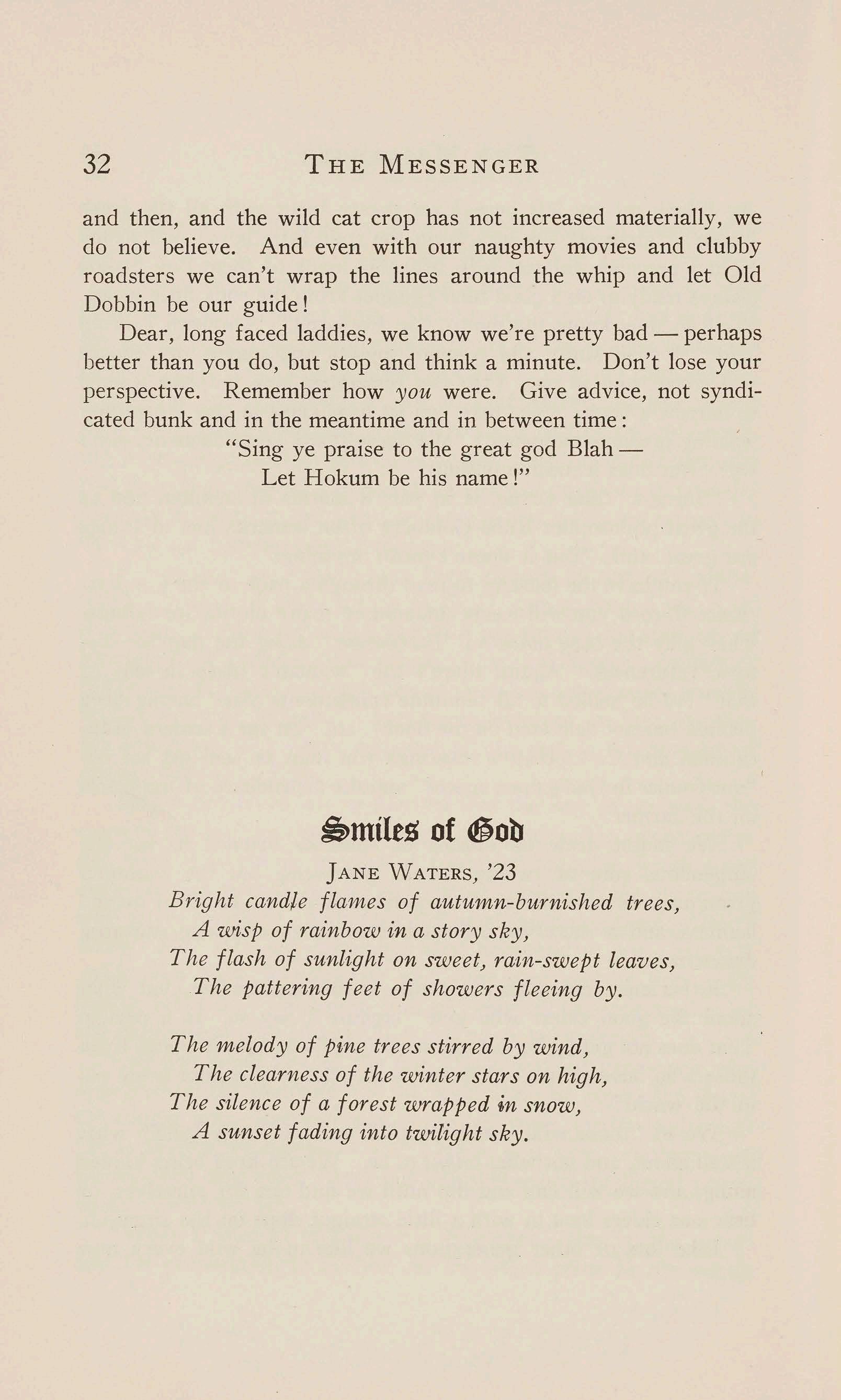
~milt~ of ~ob
JANE WATERS, '23
Bright candle flames of autumn-burnished trees, A wisp of rainbow in a story sky, The flash of sunlight on sweet, rain-swept leaves, The pattering feet of showers fleeing by.
The melody of pine trees stirred by wind, The clearness of the winter stars on high, The silence of a forest wrapped in snow, A sunset fading into twilight sky.
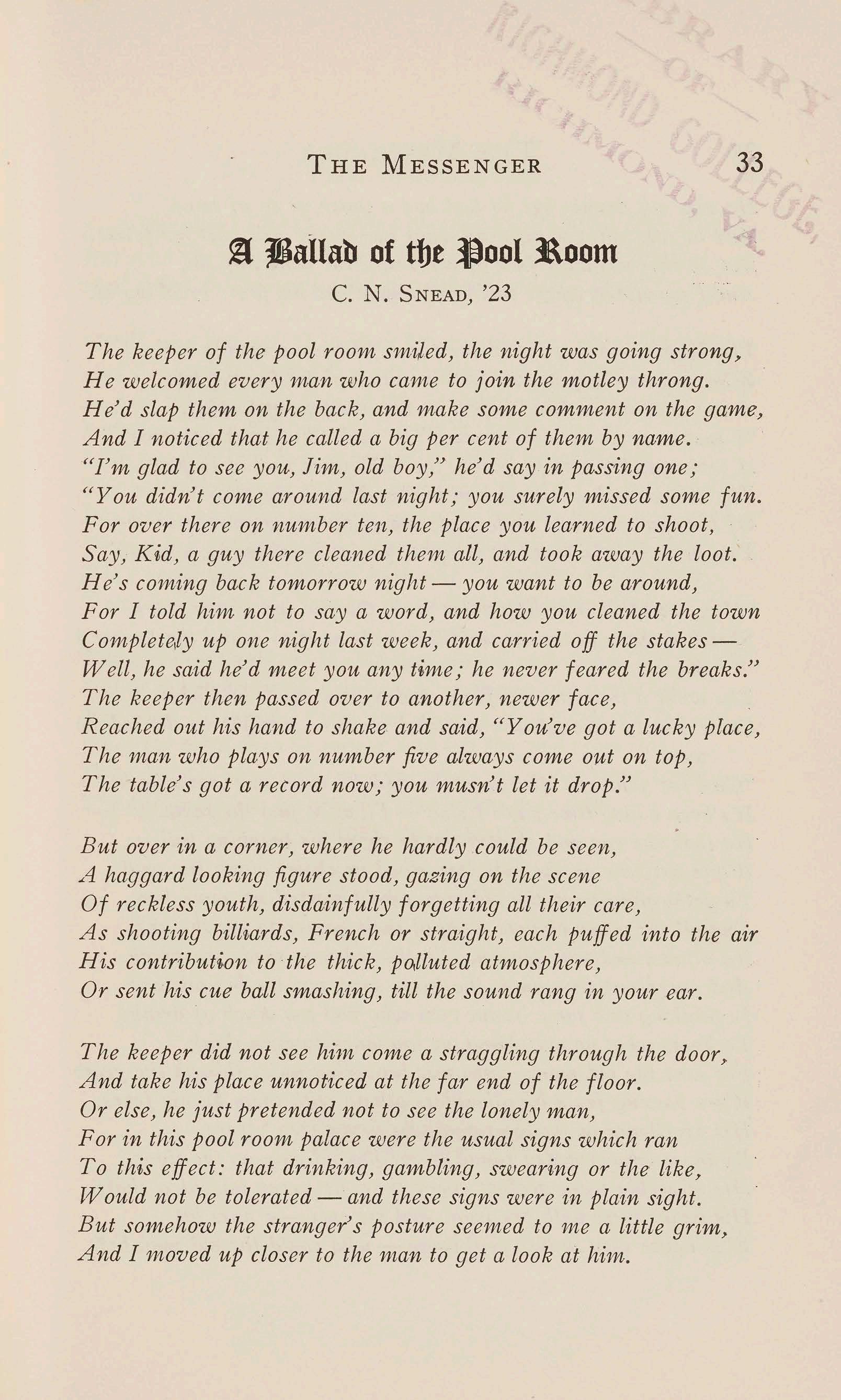
1Jjallabof tbt ~ool l\oom
C. N. SNEAD, '23
The keeper of the pool room smiled, the night was going strong, He welcomed every man who came to join the motley throng. He'd slap them on the back, and make some comment on the game, And I noticed that he called a big per cent of them by name. "I'm glad to see you, Jim, old boy," he'd say in passing one; "You didn't come around last night; you surely missed some fun. For over there on number ten, the place you learned to shoot, Say, Kid, a guy there cleaned them all, and took away the loot. He's coming back tomorrow night - you want to be around, For I told him not to say a word, and how you cleaned the town Completely up one night last week, and carried off the stakesW ell, he said he'd meet you any time; he never feared the breaks." The keeper then passed over to another, newer face, Reached out his hand to shake and said, "You've got a lucky place, The man who plays on number five always come out on top, The table's got a record now; you musn't let it drop."
But over in a corner, where he hardly could be seen, A haggard looking figure stood, gazing on the scene Of reckless youth, disdainfully forgetting all their care, As shooting billiards, French or straight, each puffed into the air His contribution to the thick, polluted atmosphere, Or sent his cue ball smashing, till the sound rang in your ear.
The keeper did not see him come a straggling through the door , And take his place unnoticed at the far end of the floor. Or else, he just pretended not to see the lonely man, For in this pool room palace were the usual signs which ran To this effect: that drinking, gambling, swearing or the like, Would not be tolerated - and these signs were in plain sight. But somehow the stranger's posture seemed to me a little grim, And I moved up closer to the man to get a look at him.
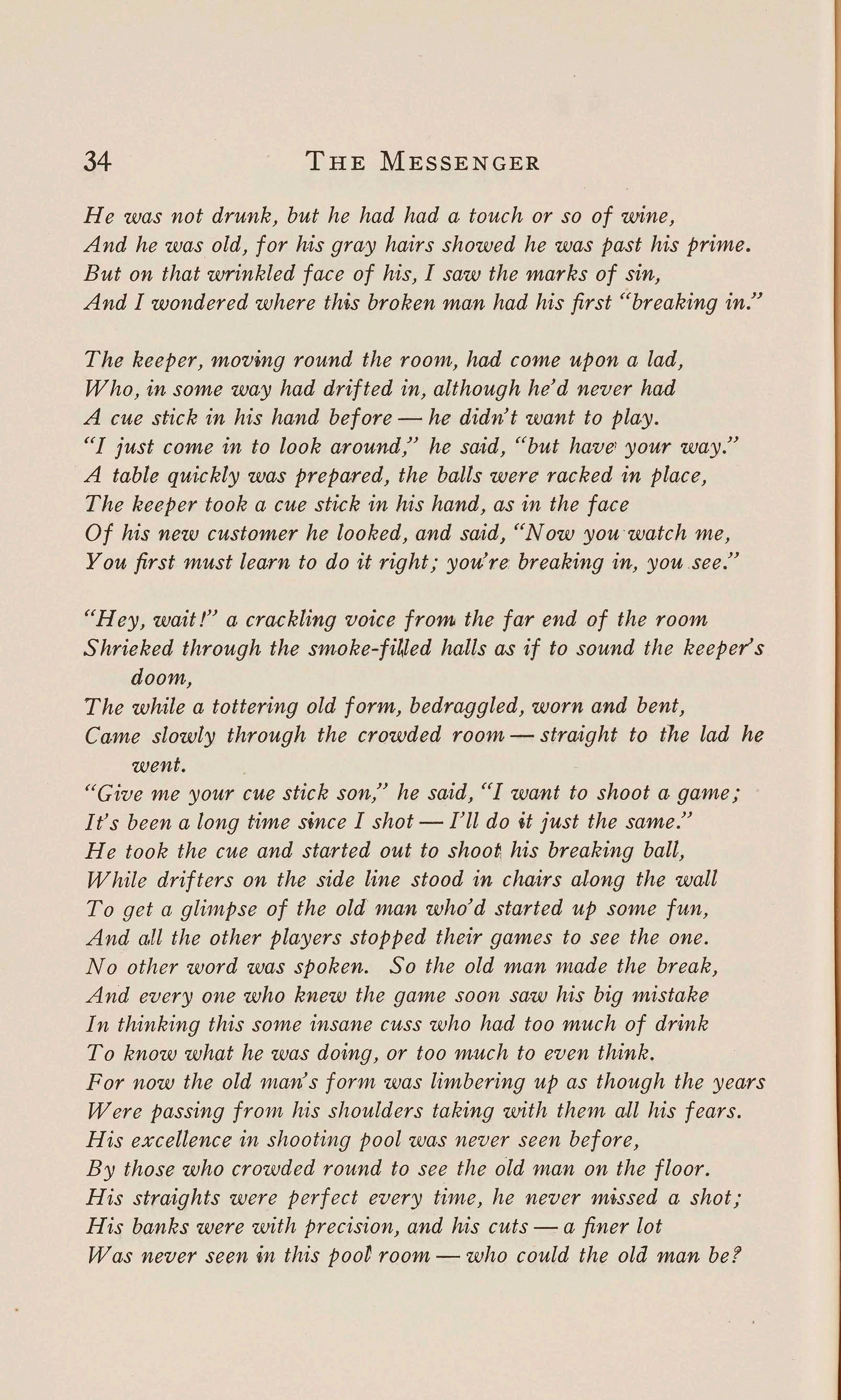
THE MESSENGER
He was not drunk, but he had had a touch or so of wine, And he was old, for his gray hairs showed he was past his prime. But on that wrinkled face of his, I saw the marks of sin, And I wondered where this broken man had his first ''breaking in."
The keeper, moving round the room, had come upon a lad, Who, in some way had drifted in, although he'd never had
A cue stick in his hand before - he didn't want to play. "I just come in to look around," he said, "but have, your way."
A table quickly was prepared, the balls went racked in place, The keeper took a cue stick in his hand, as in the face Of his new customer he looked, and said, "Now you watch me, You first must learn to do it right; you're : breaking in, you see."
"Hey, wait!" a crackling voice from the far end of the room Shrieked through the smoke-fil,led halls as if to sound the keeper's doom,
The while a tottering old form, bedraggled, worn and bent, Came slowly through the crowded room - straight to the lad he went.
"Give me your cue stick son," he said, "I want to shoot a game; It's been a long time since I shot- I'll do it just the same." He took the cue and started out to shoot, his breaking ball, While drifters on the side line stood in chairs along the wall
To get a glimpse of the old man who'd started up some fun, And a,ll the other players stopped their games to see the one. No other word was spoken. So the old man made the break, And every one who knew the game soon saw his big mistake In thinking this some insane cuss who had too much of drink
To know what he was doing, or too much to even think. For now the old man's form was limbering up as though the years Were passing from his shoulders taking with them all his fears. His excellence in shooting pool was never seen before, By those who crowded round to see the old man on the floor. His straights were perfect every time, he never missed a shot; His banks were with precision, and his cuts - a finer lot Was never seen in this pool room -who could the old man be'!
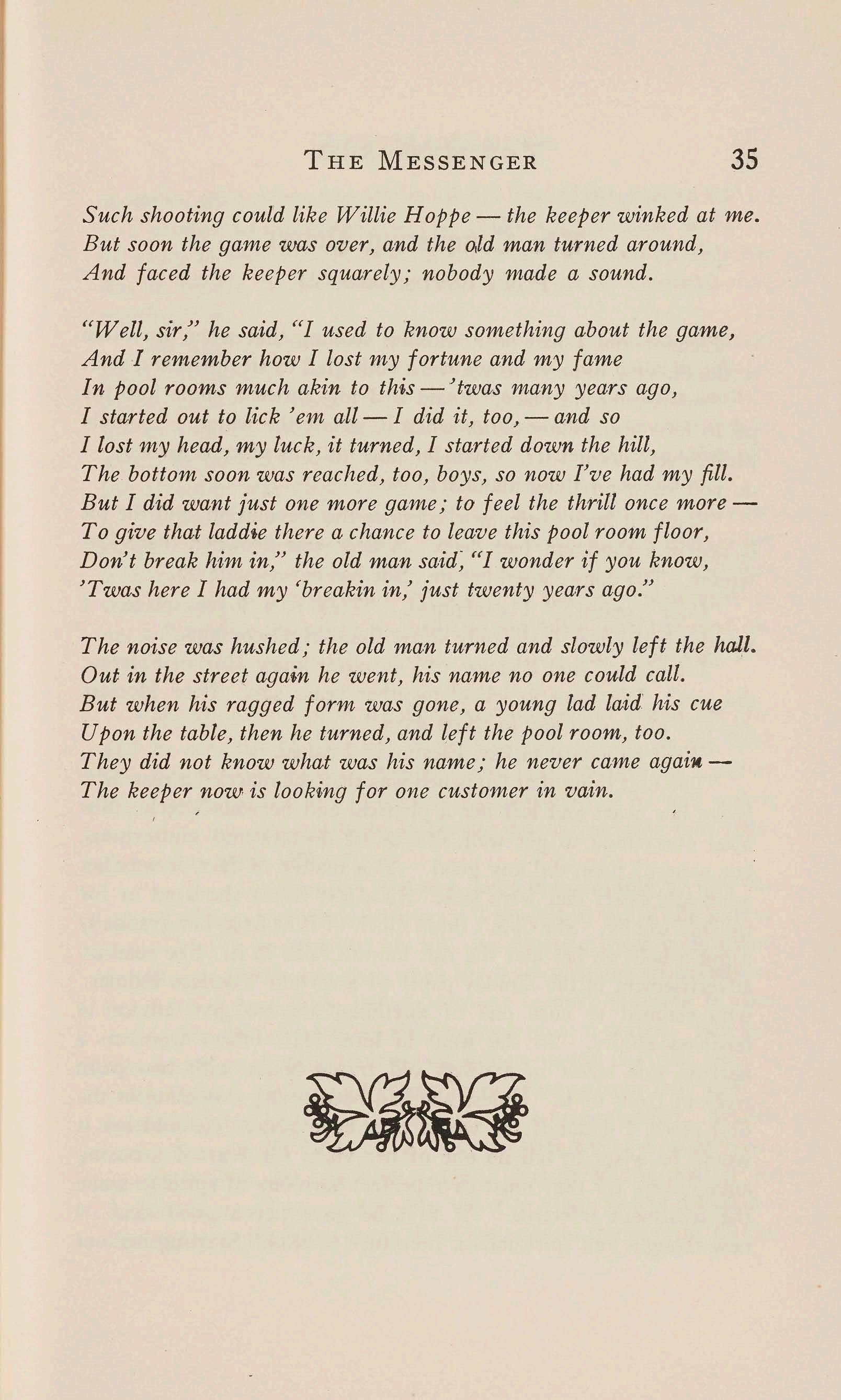
THE MESSENGER
Such shooting could like Willie Hoppe - the keeper winked at me. But soon the game was over, and the o,ld man turned around, And faced the keeper squarely; nobody made a sound.
"Well, sir," he said, "I used to know something about the game, And I remember how I lost my fortune and my fame In pool rooms much akin to this - 'twas many years ago, I started out to lick 'em all-I did it, too, - and so I lost my head, my luck, it turned, I started down the hill, The bottom soon was reached, too, boys, so now I've had my fill. But I did want just one more game; to feel the thrill once moreTo give that laddie there a chance to leave this pool room floor, Don't break him in," the old man said; "I wonder if you know, 'Twas here I had my 'breakin in,' just twenty years ago."
The noise was hushed; the old man turned and slowly left the hall. Out in the street again he went, his name no one could call. But when his ragged form was gone, a young lad laid his cue Upon the table, then he turned, and left the pool room, too. They did not know what was his name; he never came agai11,The keeper now is looking for one customer in vain.
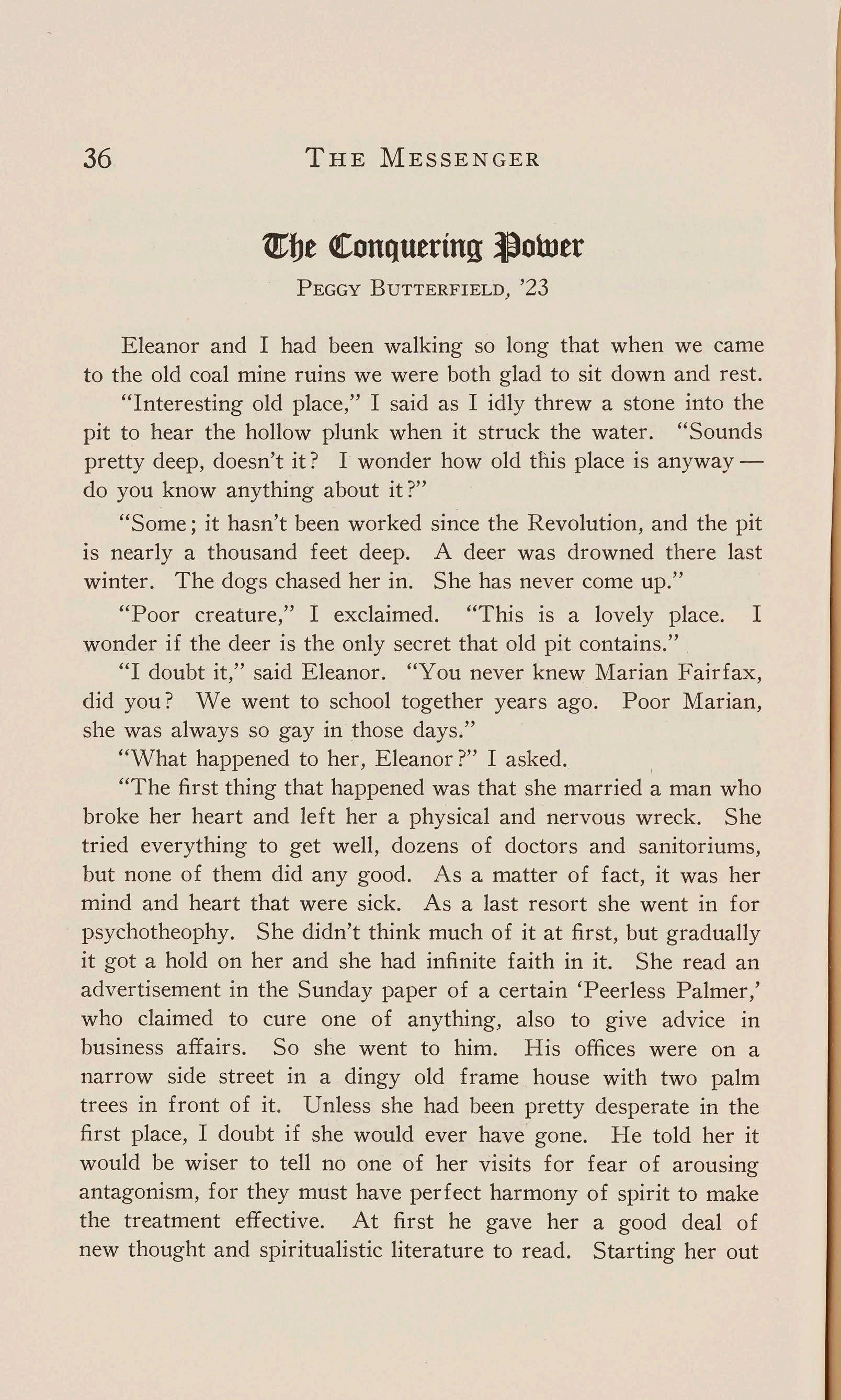
Wbt~onqueringt,obJtr
PEGGY BUTTERFIELD, '23
Eleanor and I had been walking so long that when we came to the old coal mine ruins we were both glad to sit down and rest.
"Interesting old place," I said as I idly threw a stone into the pit to hear the hollow plunk when it struck the water. "Sounds pretty deep, doesn't it? I wonder how old this place is anywaydo you know anything about it?"
"Some; it hasn't been worked since the Revolution, and the pit is nearly a thousand feet deep. A deer was drowned there last winter. The dogs chased her in. She has never come up."
"Poor creature," I exclaimed. "This is a lovely place. I wonder if the deer is the only secret that old pit contains."
"I doubt it," said Eleanor. "You never knew Marian Fairfax, did you? We went to school together years ago. Poor Marian, she was always so gay in those days."
"What happened to her, Eleanor ?" I asked.
"The first thing that happened was that she married a man who broke her heart and left her a physical and nervous wreck. She tried everything to get well, dozens of doctors and sanitariums, but none of them did any good. As a matter of fact, it was her mind and heart that were sick. As a last resort she went in for psychotheophy. She didn't think much of it at first, but gradually it got a hold on her and she had infinite faith in it. She read an advertisement in the Sunday paper of a certain 'Peerless Palmer,' who claimed to cure one of anything, also to give advice in business affairs. So she went to him. His offices were on a narrow side street in a dingy old frame house with two palm trees in front of it. Unless she had been pretty desperate in the first place, I doubt if she would ever have gone. He told her it would be wiser to tell no one of her visits for fear of arousing antagonism, for they must have perfect harmony of spirit to make the treatment effective. At first he gave her a good deal of new thought and spiritualistic literature to read. Starting her out
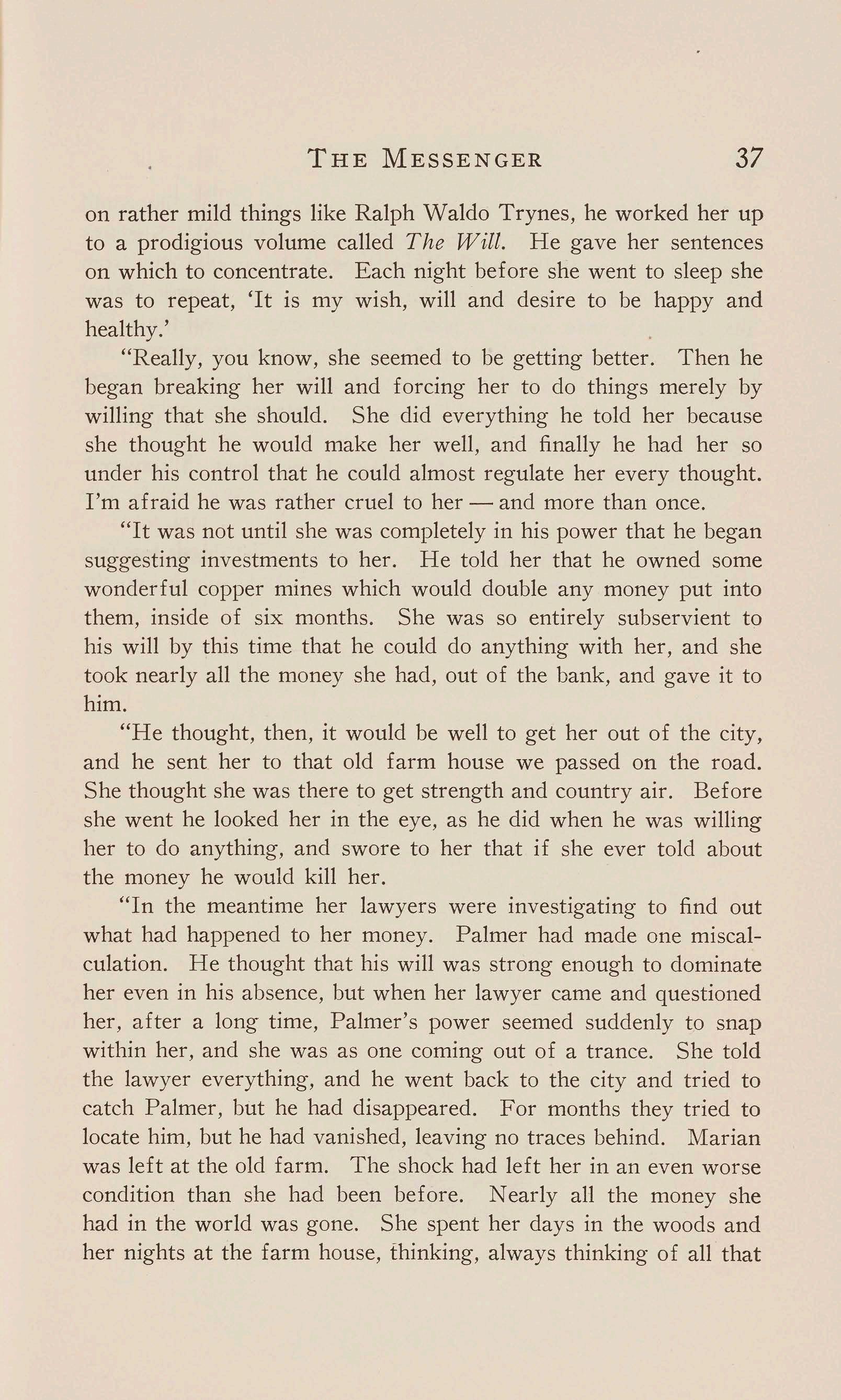
on rather mild things like Ralph Waldo Trynes, he worked her up to a prodigious volume called The Will. He gave her sentences on which to concentrate. Each night before she went to sleep she was to repeat, 'It is my wish, will and desire to be happy and healthy.'
"Really, you know, she seemed to be getting better. Then he began breaking her will and forcing her to do things merely by willing that she should. She did everything he told her because she thought he would make her well, and finally he had her so under his control that he could almost regulate her every thought. I'm afraid he was rather cruel to her -and more than once.
"It was not until she was completely in his power that he began suggesting investments to her. He told her that he owned some wonderful copper mines which would double any money put into them, inside of six months. She was so entirely subservient to his will by this time that he could do anything with her, and she took nearly all the money she had, out of the bank, and gave it to him.
"He thought , then, it would be well to get her out of the city, and he sent her to that old farm house we passed on the road. She thought she was there to get strength and country air. Before she went he looked her in the eye, as he did when he was willing her to do anything, and swore to her that if she ever told about the money he would kill her.
"In the meantime her lawyers were investigating to find out what had happened to her money. Palmer had made one miscalculation. He thought that his will was strong enough to dominate her even in his absence, but when her lawyer came and questioned her, after a long time, Palmer's power seemed suddenly to snap within her, and she was as one coming out of a trance. She told the lawyer everything, and he went back to the city and tried to catch Palmer, but he had disappeared. For months they tried to locate him , but he had vanished, leaving no traces behind. Marian was left at the old farm. The shock had left her in an even worse condition than she had been before. Nearly all the money she had in the world was gone. She spent her days in the woods and her nights at the farm house, thinking, always thinking of all that
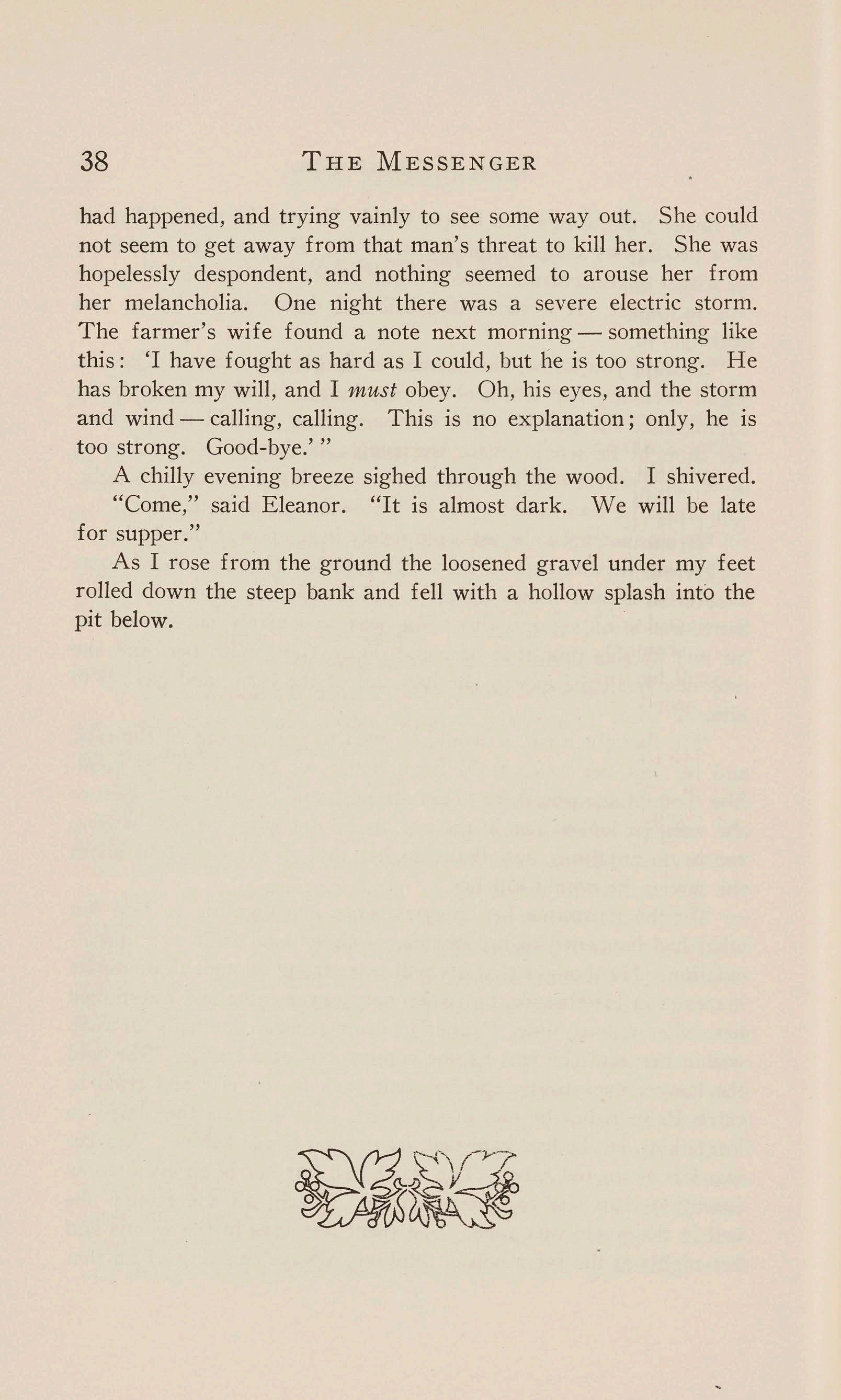
THE MESSENGER
had happened, and trying vainly to see some way out. She could not seem to get away from that man's threat to kill her. She was hopelessly despondent, and nothing seemed to arouse her from her melancholia. One night there was a severe electric storm. The farmer's wife found a note next morning-something like this: 'I have fought as hard as I could, but he is too strong. He has broken my will, and I must obey. Oh, his eyes, and the storm and wind - calling, calling. This is no explanation; only, he is too strong. Good-bye.'"
A chilly evening breeze sighed through the wood. I shivered. "Come," said Eleanor. "It is almost dark. We will be late for supper."
As I rose from the ground the loosened gravel under my feet rolled down the steep bank and fell with a hollow splash info the pit below.
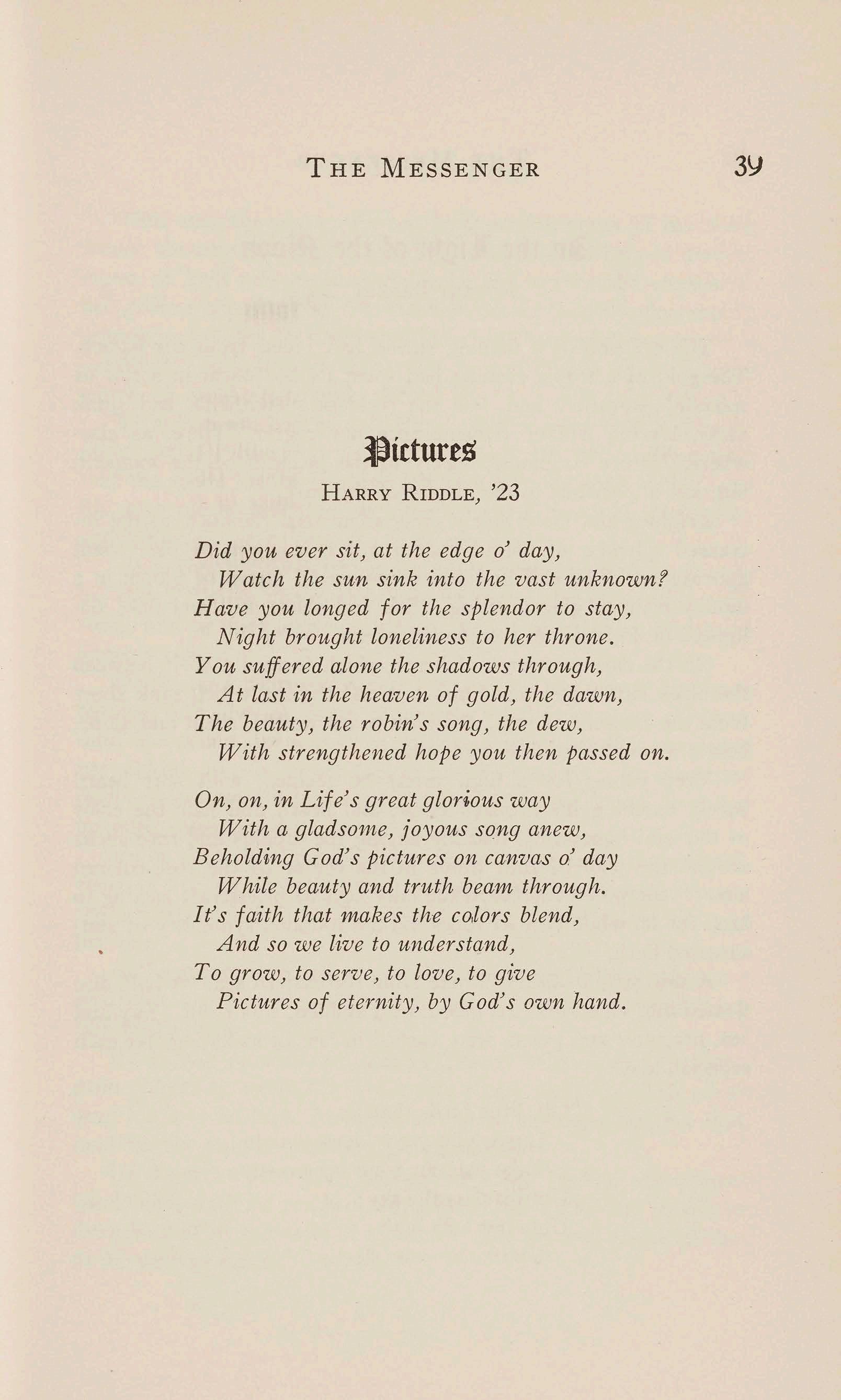
~ictures
HARRY RIDDLE, '23
Did you ever sit, at the edge o' day, Watch the sun sink into the vast unknown? Have you longed for the splendor to stay, Night brought loneliness to her throne. You suffered alone the shadows through, At last in the heaven of gold, the dawn, The beauty, the robin's song, the dew, With strengthened hope you then passed on.
On, on, in Life's great glorious way With a gladsome, joyous song anew, Beholding God's pictures on canvas o' day While beauty and truth beam through. It's faith that makes the co,lors blend, And so we live to understand, To grow, to serve, to love, to give Pictures of eternity, by God's own hand.
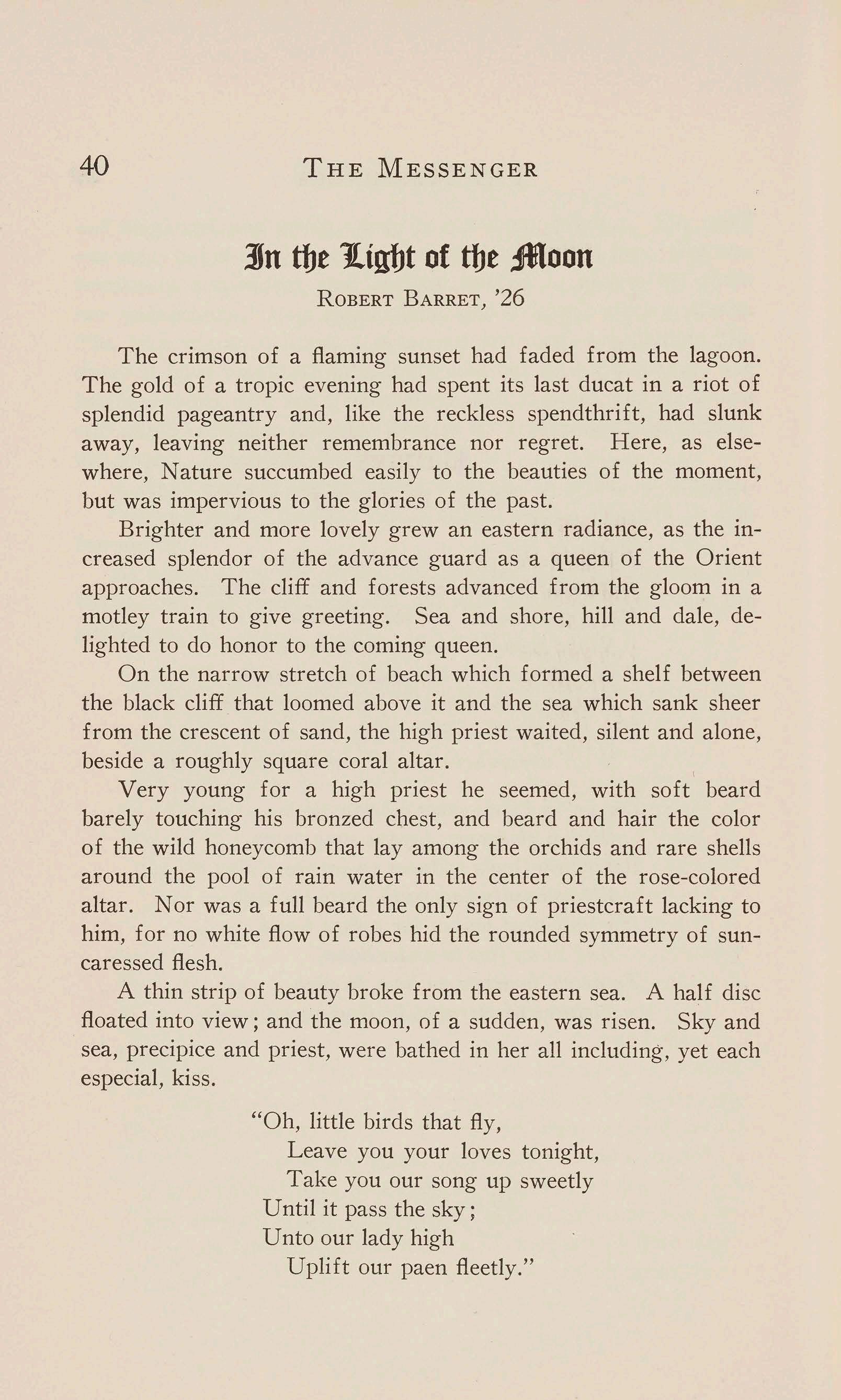
lfn tbeJLigfJtof tbe.moon
ROBERT BARRET, '26
The crimson of a flaming sunset had faded from the lagoon. The gold of a tropic evening had spent its last ducat in a riot of splendid pageantry and, like the reckless spendthrift, had slunk away, leaving neither remembrance nor regret. Here, as elsewhere, Nature succumbed easily to the beauties of the moment, but was impervious to the glories of the past.
Brighter and more lovely grew an eastern radiance, as the increased splendor of the advance guard as a queen of the Orient approaches. The cliff and forests advanced from the gloom in a motley train to give greeting. Sea and shore, hill and dale, delighted to do honor to the coming queen.
On the narrow stretch of beach which formed a shelf between the black cliff that loomed above it and the sea which sank sheer from the crescent of sand, the high priest waited, silent and alone, beside a roughly square coral altar.
Very young for a high priest he seemed, with soft beard barely touching his bronzed chest, and beard and hair the color of the wild honeycomb that lay among the orchids and rare shells around the pool of rain water in the center of the rose-colored altar. Nor was a full beard the only sign of priestcraf t lacking to him, for no white flow of robes hid the rounded symmetry of suncaressed flesh.
A thin strip of beauty broke from the eastern sea. A half disc floated into view; and the moon, of a sudden, was risen. Sky and sea, precipice and priest, were bathed in her all including, yet each especial, kiss.
"Oh, little birds that fly, Leave you your loves tonight, Take you our song up sweetly Until it pass the sky; Unto our lady high Uplift our paen fleetly."
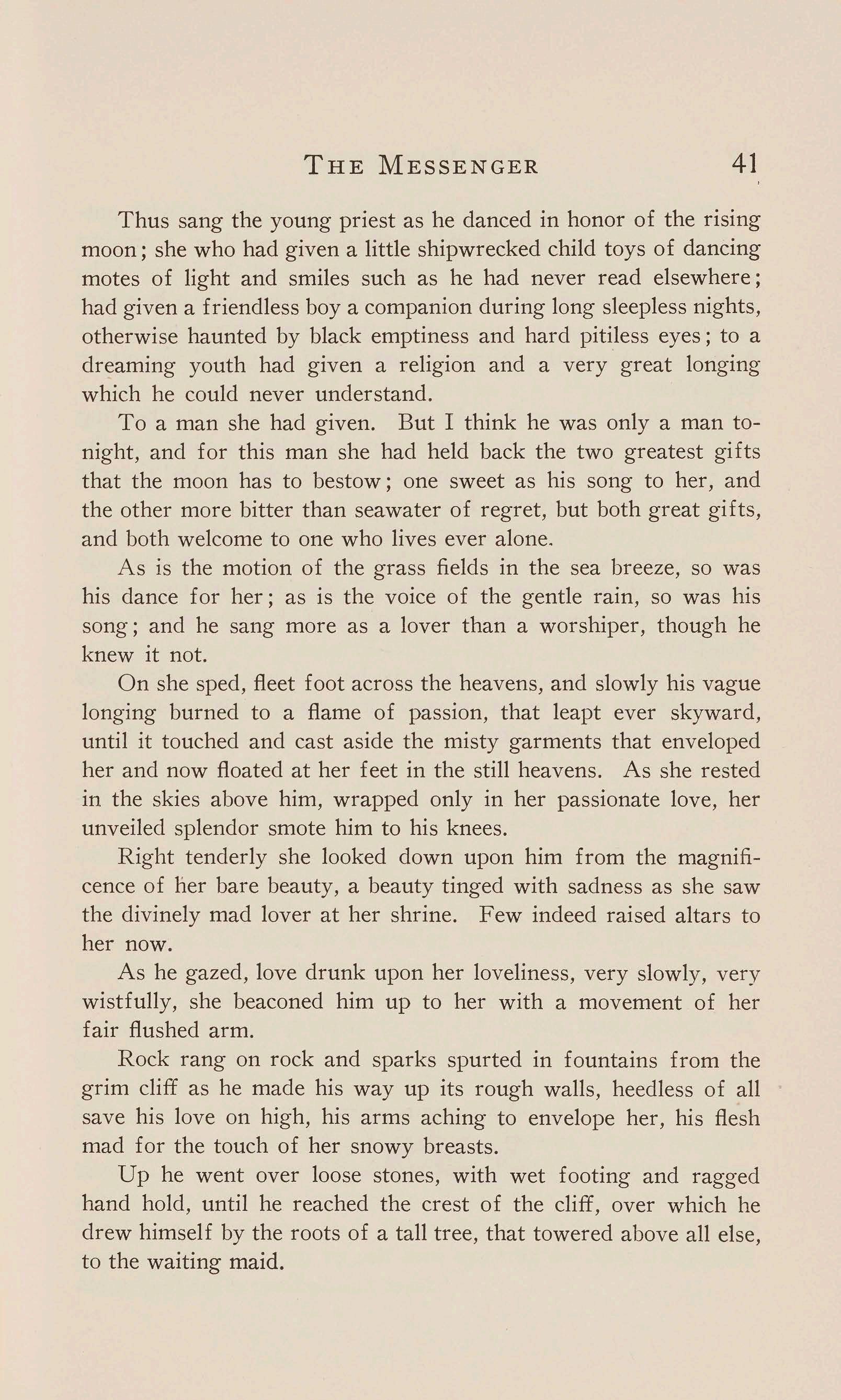
Thus sang the young priest as he danced in honor of the rising moon; she who had given a little shipwrecked child toys of dancing motes of light and smiles such as he had never read elsewhere ; had given a friendless boy a companion during long sleepless nights, otherwise haunted by black emptiness and hard pitiless eyes ; to a dreaming youth had given a religion and a very great longing which he could never understand.
To a man she had given. But I think he was only a man tonight, and for this man she had held back the two greatest gifts that the moon has to bestow; one sweet as his song to her, and the other more bitter than seawater of regret, but both great gifts, and both welcome to one who lives ever alone.
As is the motion of the grass fields in the sea breeze, so was his dance for her ; as is the voice of the gentle rain, so was his song; and he sang more as a lover than a worshiper, though he knew it not.
On she sped, fleet foot across the heavens, and slowly his vague longing burned to a flame of passion, that leapt ever skyward, until it touched and cast aside the misty garments that enveloped her and now floated at her feet in the still heavens. As she rested in the skies above him, wrapped only in her passionate love, her unveiled splendor smote him to his knees.
Right tenderly she looked down upon him from the magnificence of her bare beauty, a beauty tinged with sadness as she saw the divinely mad lover at her shrine. Few indeed raised altars to her now.
As he gazed, love drunk upon her loveliness, very slowly, very wistfully, she beaconed him up to her with a movement of her fair flushed arm.
Rock rang on rock and sparks spurted in fountains from the grim cliff as he made his way up its rough walls, heedless of all save his love on high, his arms aching to envelope her, his flesh mad for the touch of her snowy breasts.
Up he went over loose stones, with wet footing and ragged hand hold, until he reached the crest of the cliff, over which he drew himself by the roots of a tall tree, that towered above all else, to the waiting maid.
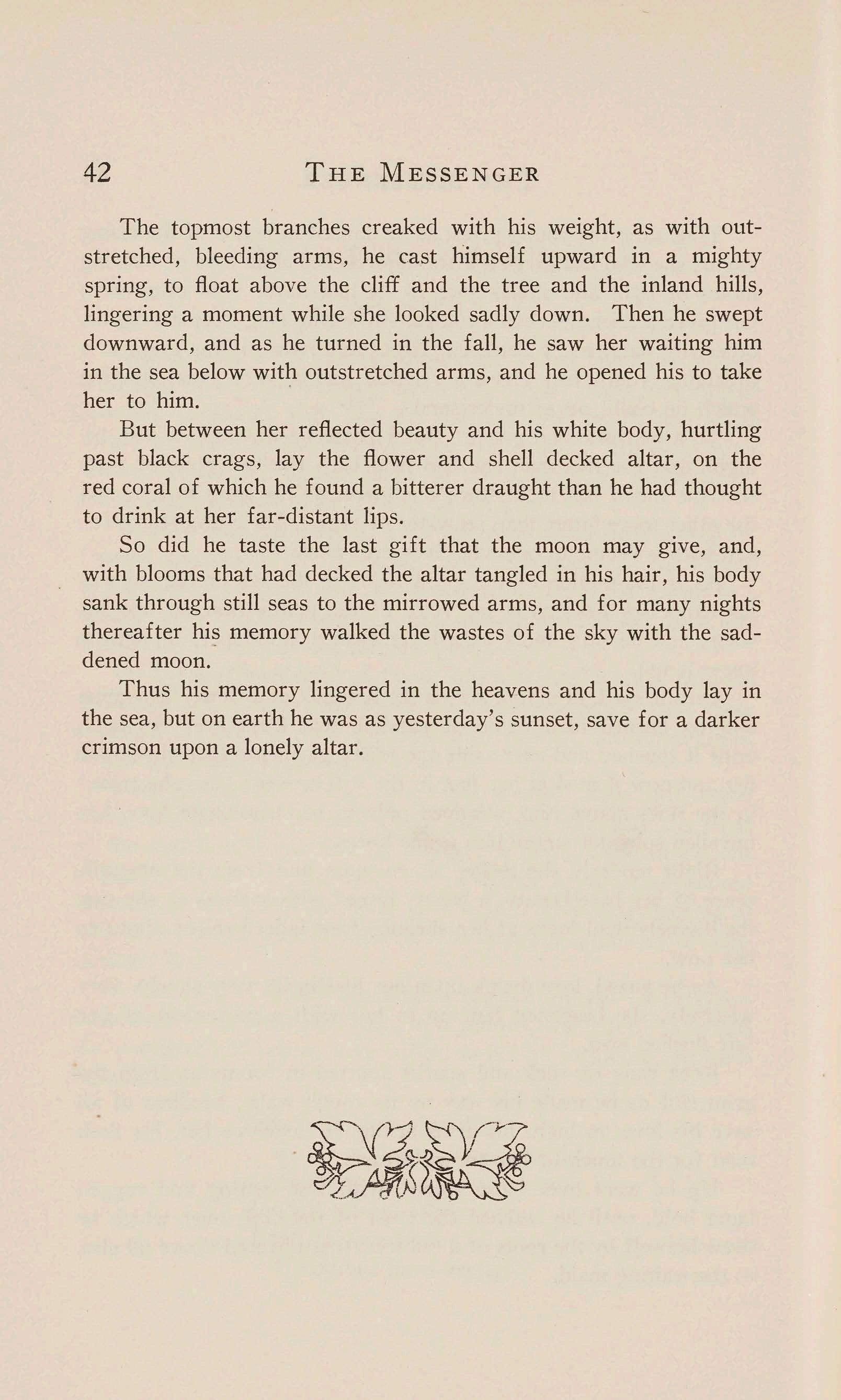
THE MESSENGER
The topmost branches creaked with his weight, as with outstretched, bleeding arms, he cast himself upward in a mighty spring, to float above the cliff and the tree and the inland hills, lingering a moment while she looked sadly down. Then he swept downward, and as he turned in the fall, he saw her waiting him in the sea below with outstretched arms, and he opened his to take her to him.
But between her reflected beauty and his white body, hurtling past black crags, lay the flower and shell decked altar, on the red coral of which he found a bitterer draught than he had thought to drink at her far-distant lips.
So did he taste the last gift that the moon may give, and, with blooms that had decked the altar tangled in his hair, his body sank through still seas to the mirrowed arms, and for many nights thereafter his memory walked the wastes of the sky with the saddened moon.
Thus his memory lingered in the heavens and his body lay in the sea, but on earth he was as yesterday's sunset, save for a darker crimson upon a lonely altar.
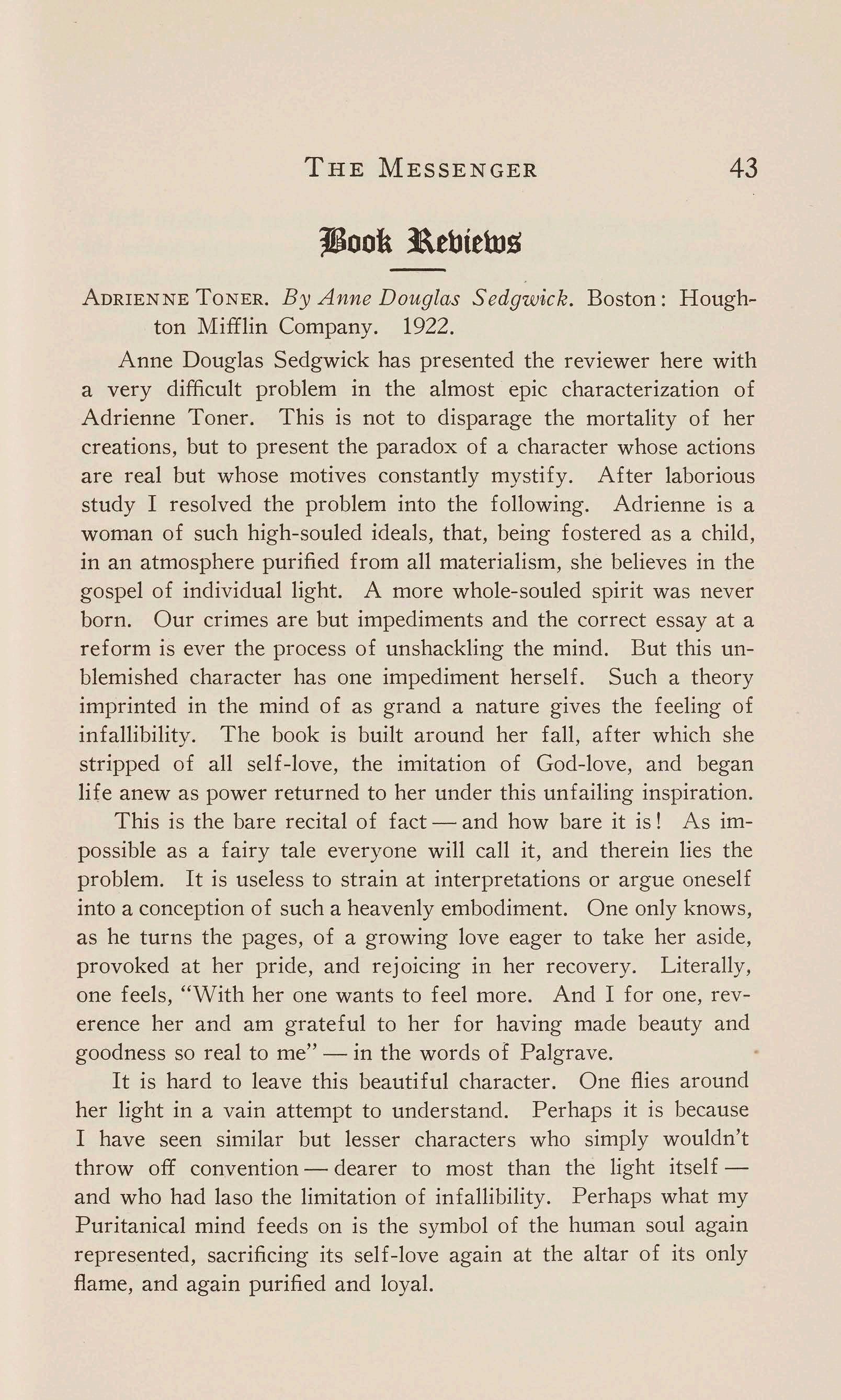
•ooh l\tbittus
ADRIENNETONER. By Anne Douglas Sedgwick. Boston: Houghton Mifflin Company. 1922.
Anne Douglas Sedgwick has presented the reviewer here with a very difficult problem in the almost epic characterization of Adrienne Toner. This is not to disparage the mortality of her creations, but to present the paradox of a character whose actions are real but whose motives constantly mystify. After laborious study I resolved the problem into the following. Adrienne is a woman of such high-souled ideals, that, being fostered as a child, in an atmosphere purified from all materialism, she believes in the gospel of individual light. A more whole-souled spirit was never born. Our crimes are but impediments and the correct essay at a reform is ever the process of unshackling the mind. But this unblemished character has one impediment herself. Such a theory imprinted in the mind of as grand a nature gives the feeling of infallibility. The book is built around her fall, after which she stripped of all self-love, the imitation of God-love, and began life anew as power returned to her under this unfailing inspiration. This is the bare recital of fact -and how bare it is! As impossible as a fairy tale everyone will call it, and therein lies the problem. It is useless to strain at interpretations or argue oneself into a conception of such a heavenly embodiment. One only knows, as he turns the pages, of a growing love eager to take her aside, provoked at her pride, and rejoicing in her recovery. Literally, one feels, "With her one wants to feel more. And I for one , reverence her and am grateful to her for having made beauty and goodness so real to me" -in the words of Palgrave. It is hard to leave this beautiful character. One flies around her light in a vain attempt to understand. Perhaps it is because I have seen similar but lesser characters who simply wouldn't throw off convention -dearer to most than the light itselfand who had Jaso the limitation of infallibility. Perhaps what my Puritanical mind feeds on is the symbol of the human soul again represented, sacrificing its self-love again at the altar of its only flame, and again purified and loyal.
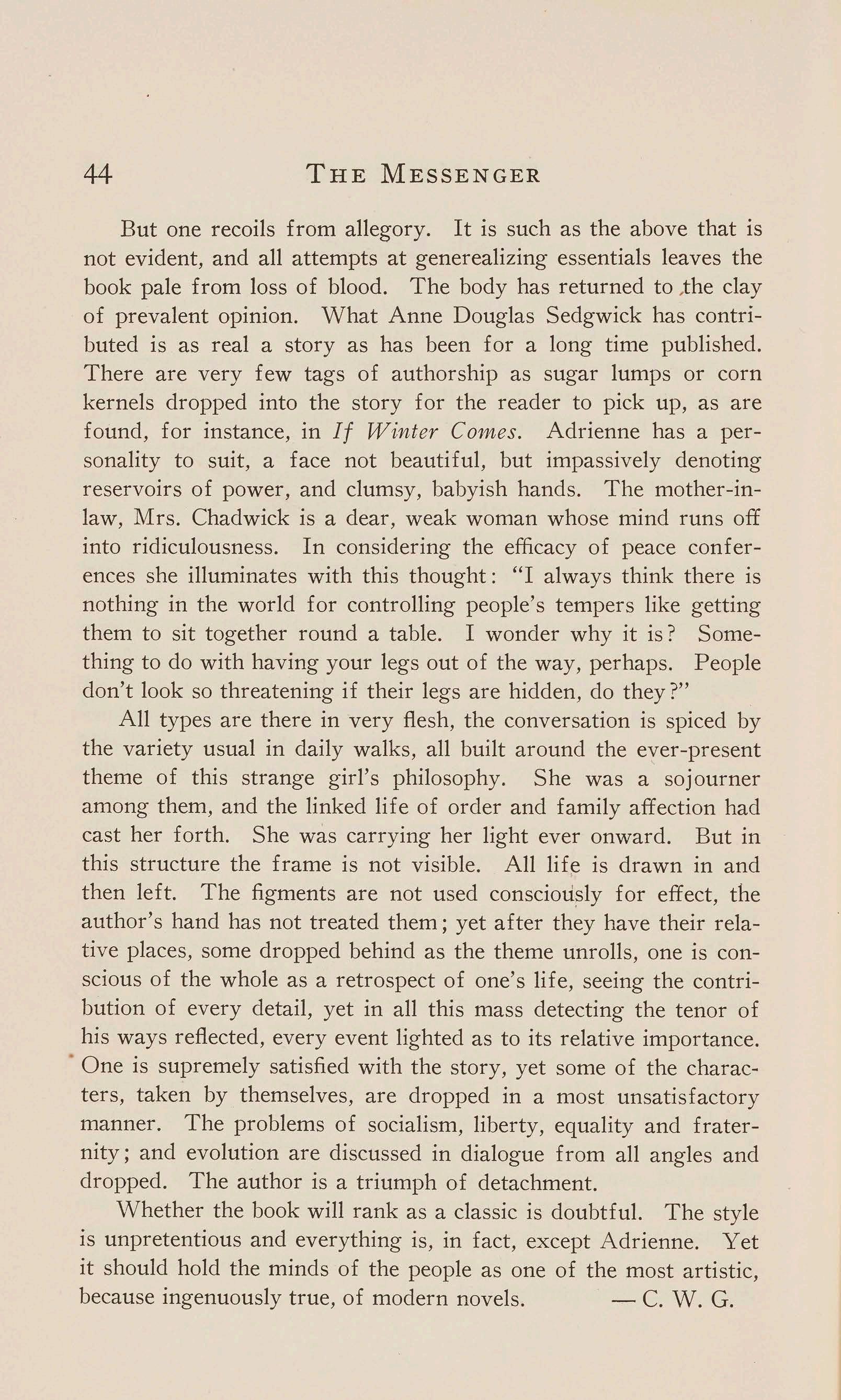
THE MESSENGER
But one recoils from allegory. It is such as the above that is not evident, and all attempts at generealizing essentials leaves the book pale from loss of blood. The body has returned to ,the clay of prevalent opinion. What Anne Douglas Sedgwick has contributed is as real a story as has been for a long time published. There are very few tags of authorship as sugar lumps or corn kernels dropped into the story for the reader to pick up, as are found, for instance, in / f Winter Comes. Adrienne has a personality to suit, a face not beautiful, but impassively denoting reservoirs of power, and clumsy, babyish hands. The mother-inlaw, Mrs. Chadwick is a dear, weak woman whose mind runs off into ridiculousness. In considering the efficacy of peace conferences she illuminates with this thought : "I always think there is nothing in the world for controlling people's tempers like getting them to sit together round a table. I wonder why it is? Something to do with having your legs out of the way, perhaps. People don't look so threatening if their legs are hidden, do they?"
All types are there in very flesh, the conversation is spiced by the variety usual in daily walks, all built around the ever-present theme of this strange girl's philosophy . She was a sojourner among them, and the linked life of order and family affection had cast her forth. She was carrying her light ever onward. But in this structure the frame is not visible. All lif~ is drawn in and then left. The figments are not used consciously for effect, the author's hand has not treated them; yet after they have their relative places, some dropped behind as the theme unrolls, one is conscious of the whole as a retrospect of one's life, seeing the contribution of every detail, yet in all this mass detecting the tenor of his ways reflected, every event lighted as to its relative importance. One is supremely satisfied with the story, yet some of the characters, taken by themselves, are dropped in a most unsatisfactory manner. The problems of socialism, liberty, equality and fraternity; and evolution are discussed in dialogue from all angles and dropped. The author is a triumph of detachment.
\Vhether the book will rank as a classic is doubtful. The style is unpretentious and everything is, in fact, except Adrienne. Yet it should hold the minds of the people as one of the most artistic, because ingenuously true, of modern novels. - C. W. G.
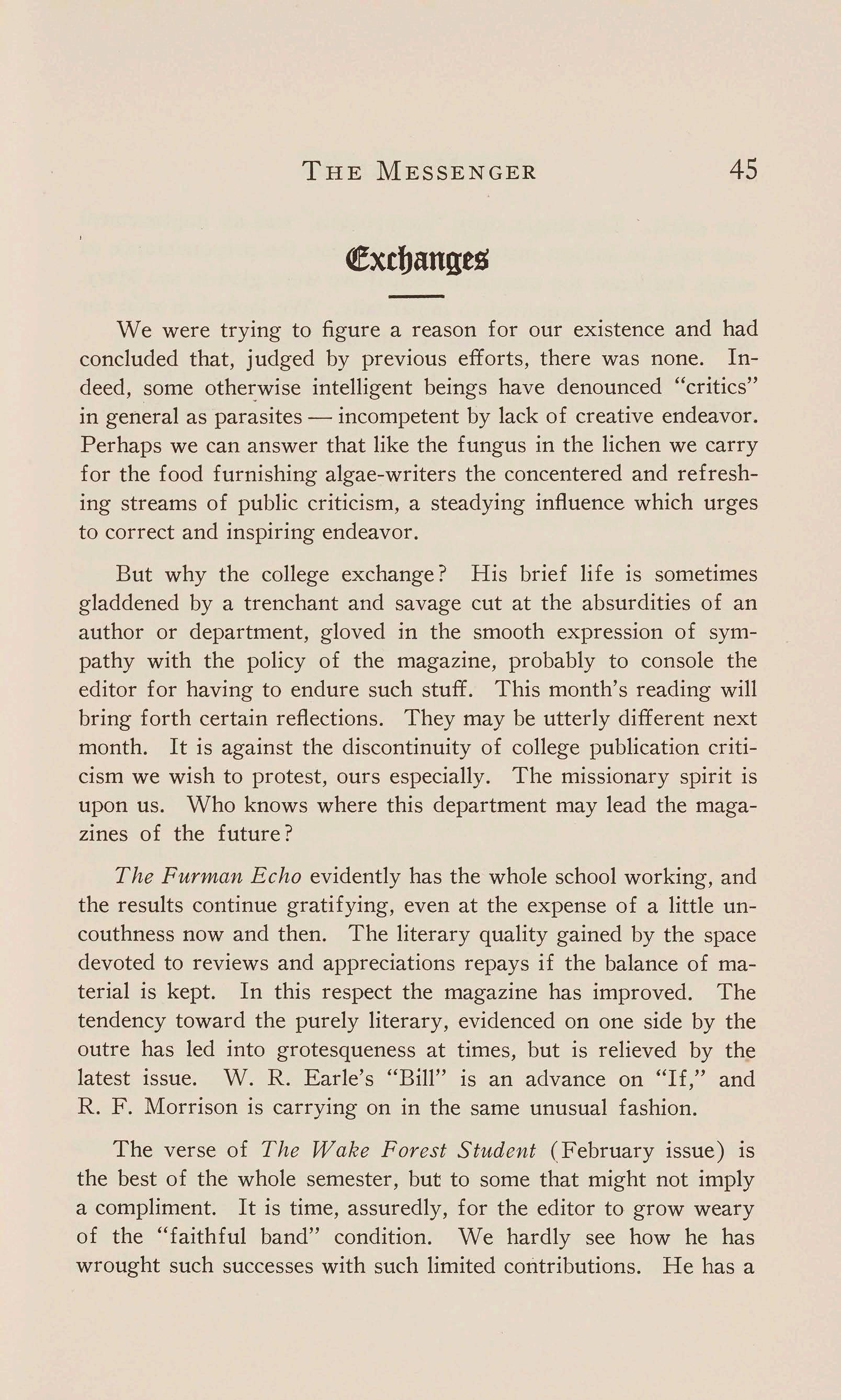
We were trying to figure a reason for our existence and had concluded that, judged by previous efforts, there was none. Indeed, some otherwise intelligent beings have denounced "critics" in general as par~sites -incompetent by lack of creative endeavor. Perhaps we can answer that like the fungus in the lichen we carry for the food furnishing algae-writers the concentered and refreshing streams of public criticism, a steadying influence which urges to correct and inspiring endeavor.
But why the college exchange? His brief life is sometimes gladdened by a trenchant and savage cut at the absurdities of an author or department, gloved in the smooth expression of sympathy with the policy of the magazine, probably to console the editor for having to endure such stuff. This month's reading will bring forth certain reflections. They may be utterly different next month. It is against the discontinuity of college publication criticism we wish to protest, ours especially. The missionary spirit is upon us. Who knows where this department may lead the magazines of the future?
The Furman Echo evidently has the whole school working, and the results continue gratifying, even at the expense of a little uncouthness now and then. The literary quality gained by the space devoted to reviews and appreciations repays if the balance of material is kept. In this respect the magazine has improved. The tendency toward the purely literary, evidenced on one side by the outre has led into grotesqueness at times, but is relieved by the latest issue. W. R. Earle's "Bill" is an advance on "If," and R. F. Morrison is carrying on in the same unusual fashion.
The verse of The Wake Forest Student (February issue) is the best of the whole semester, but to some that might not imply a compliment. It is time, assuredly, for the editor to grow weary of the "faithful band" condition. We hardly see how he has wrought such successes with such limited contributions. He has a
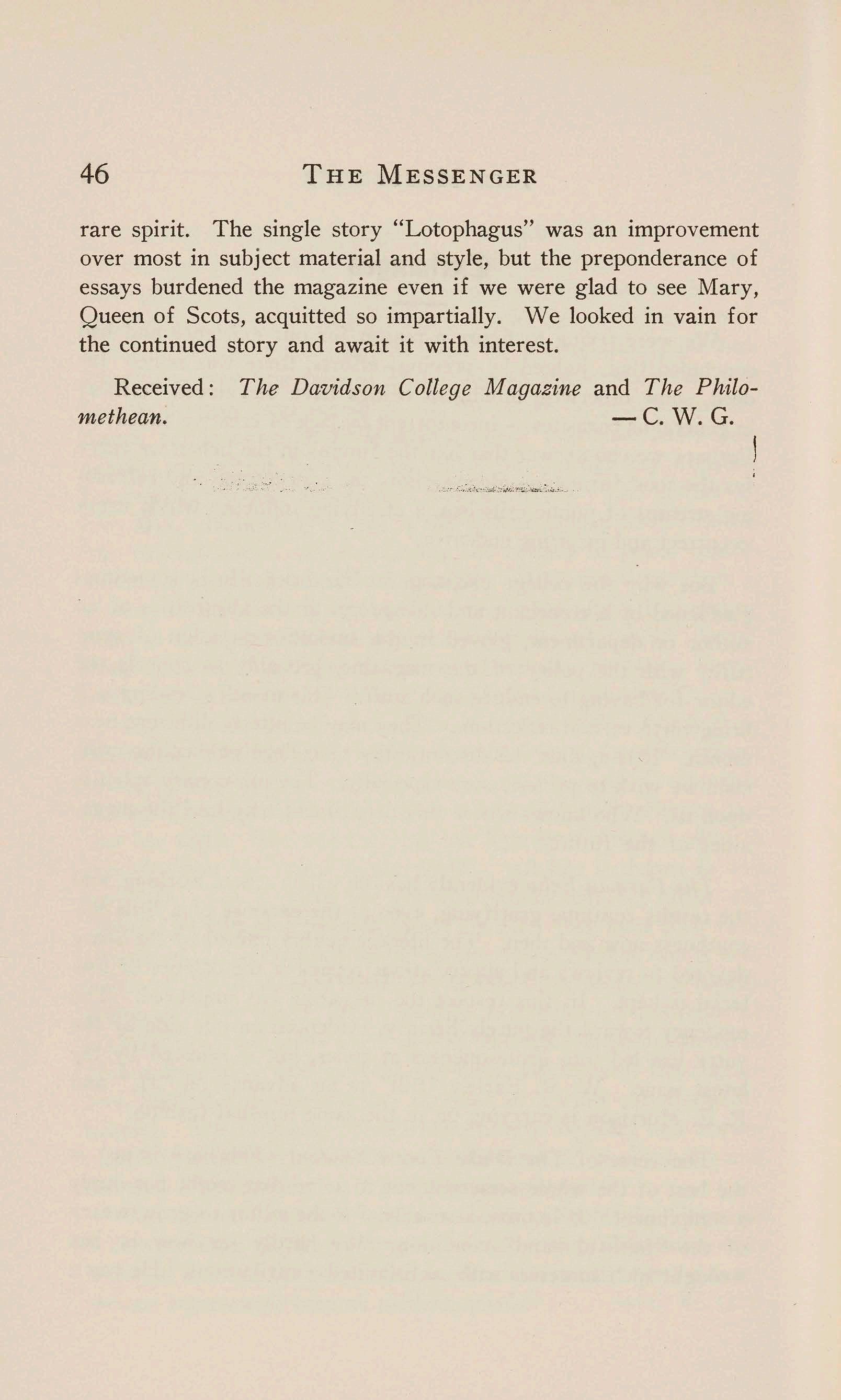
THE MESSENGER
rare spmt. The single story "Lotophagus" was an improvement over most in subject material and style, but the preponderance of essays burdened the magazine even if we were glad to see Mary, Queen of Scots, acquitted so impartially. We looked in vain for the continued story and await it with interest.
Received: The Davidson College Magazine and The Philomethean.
-C. W. G.
